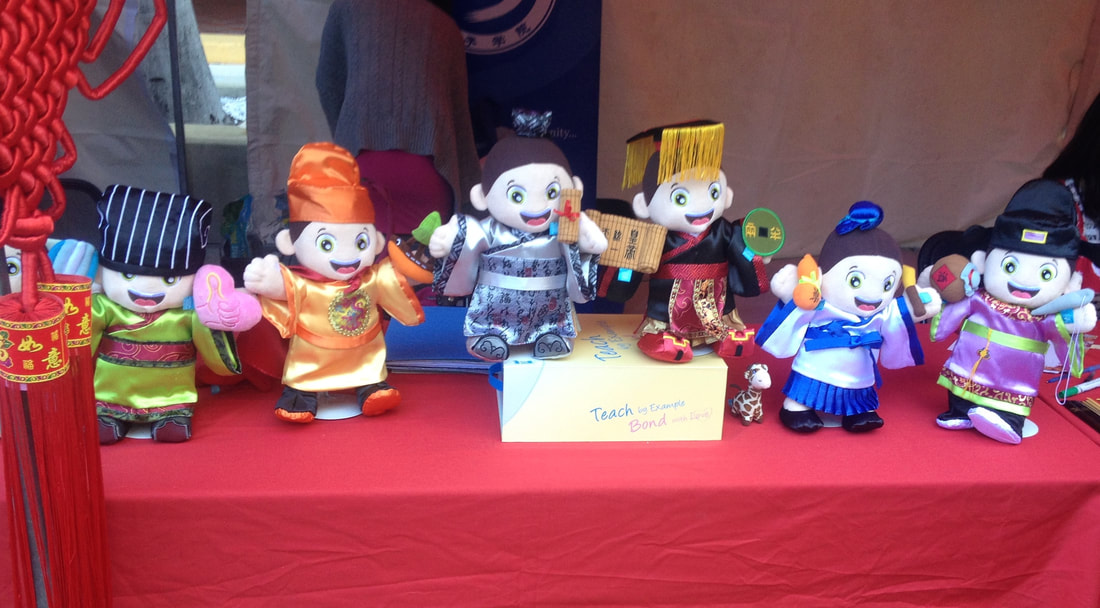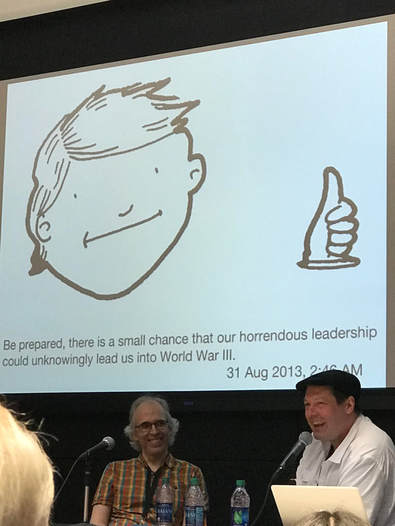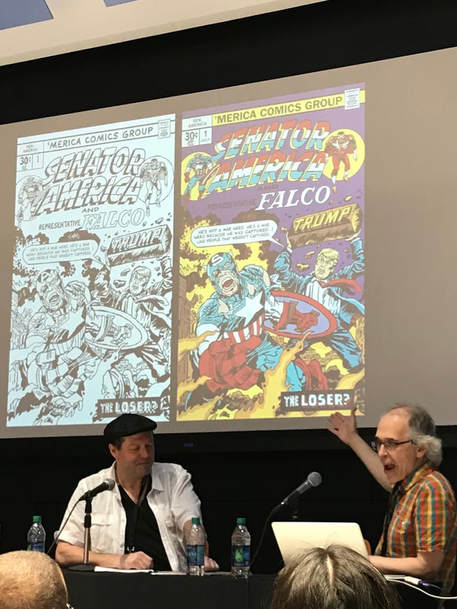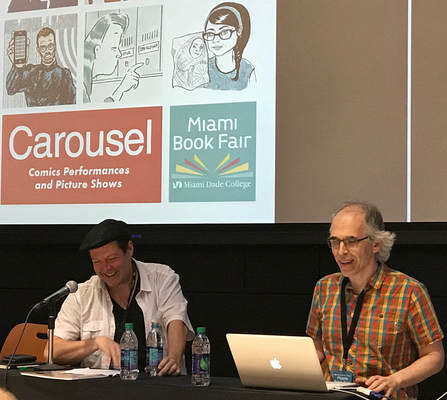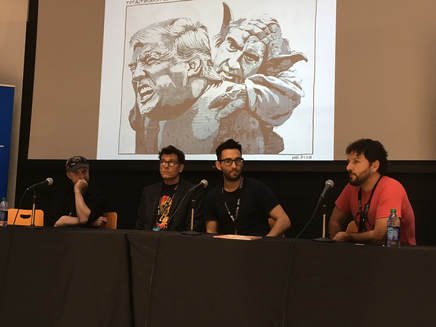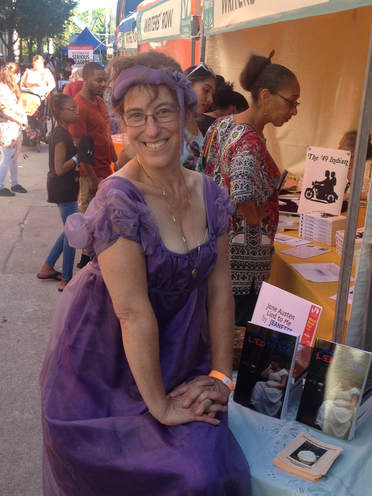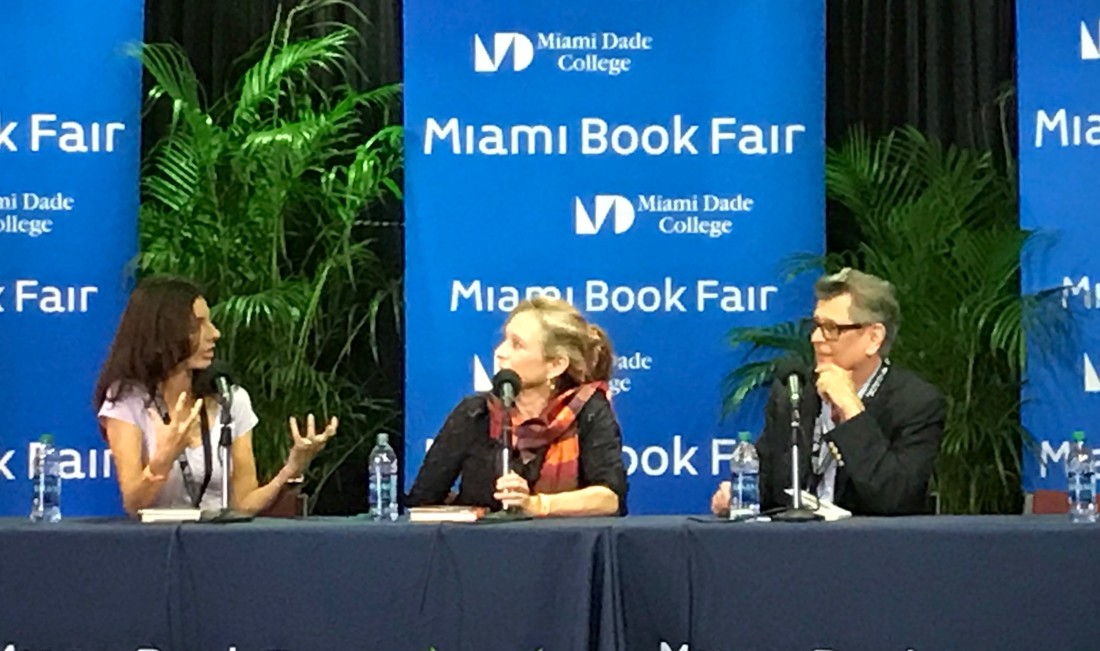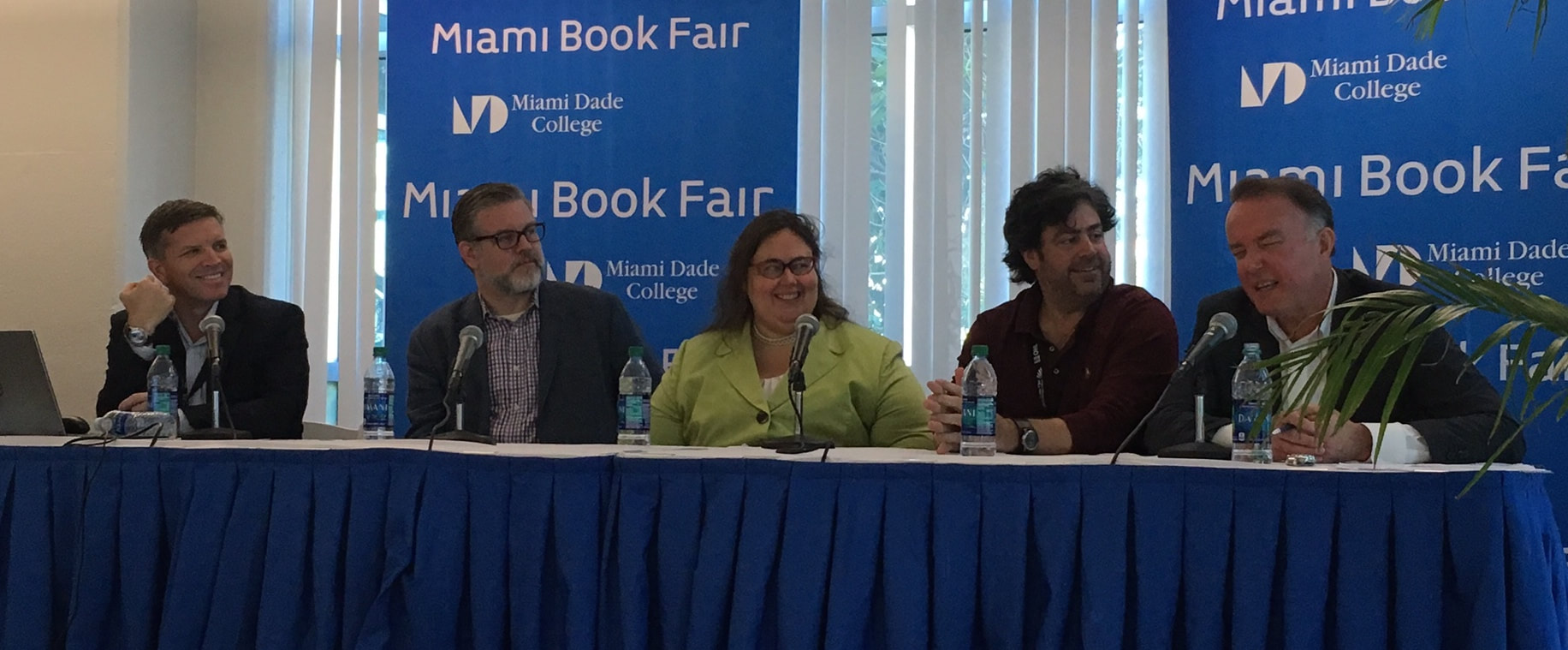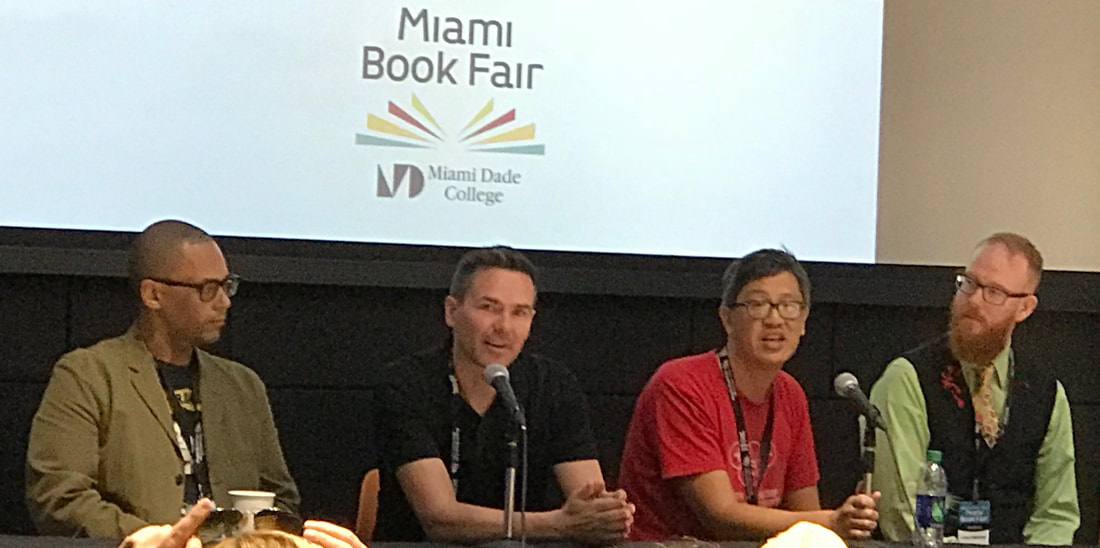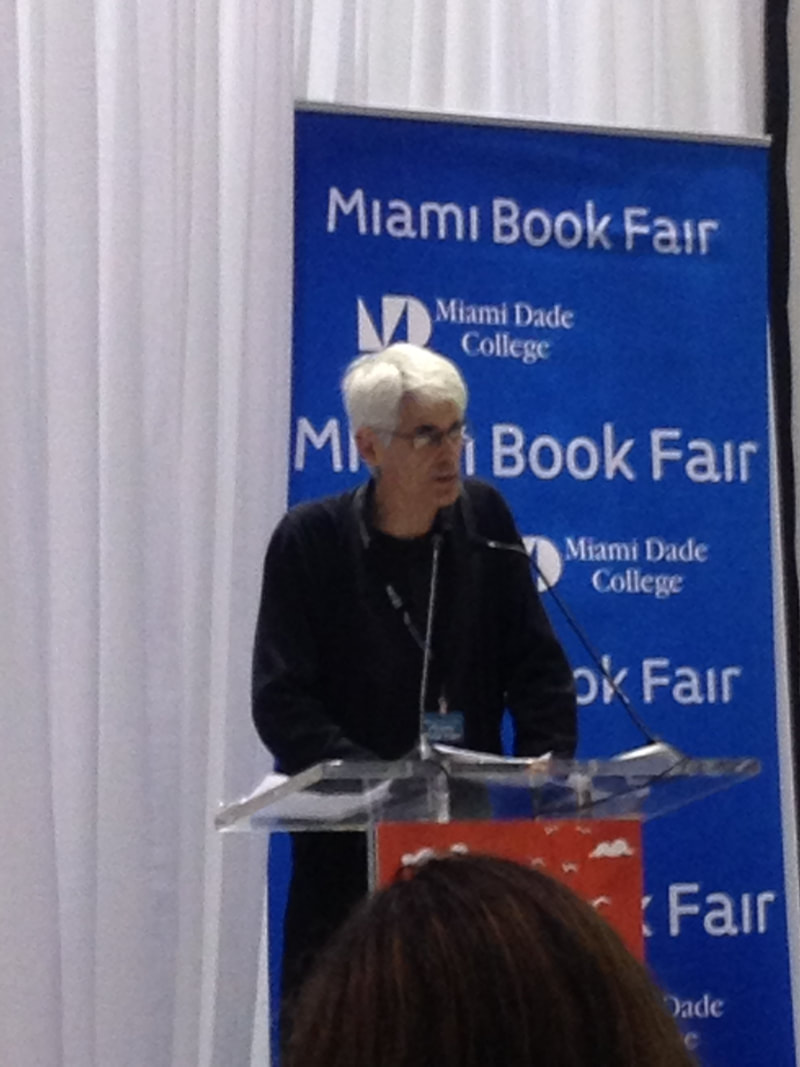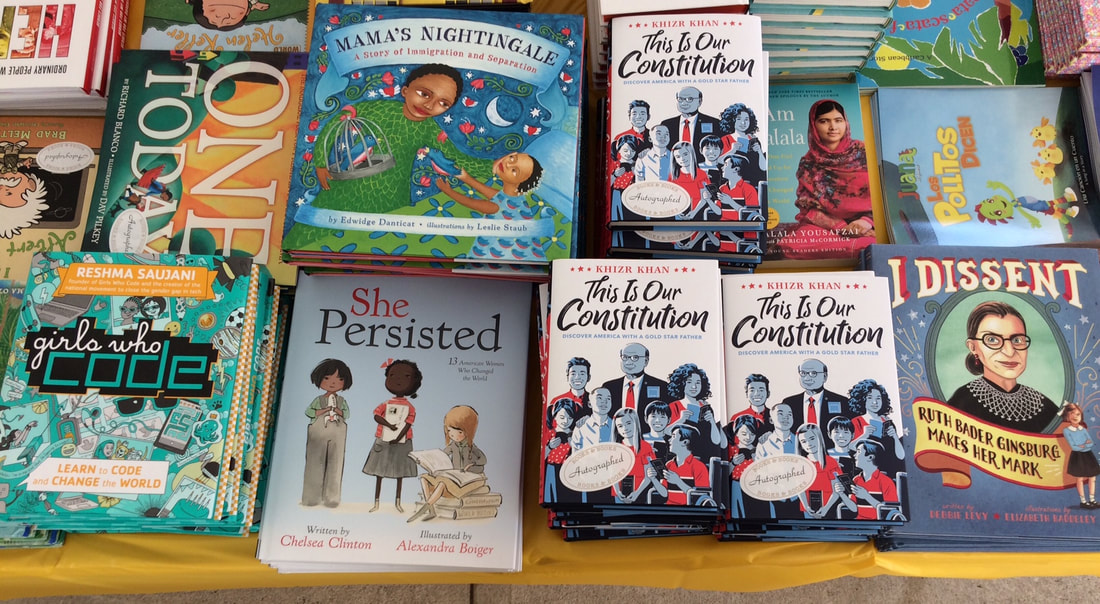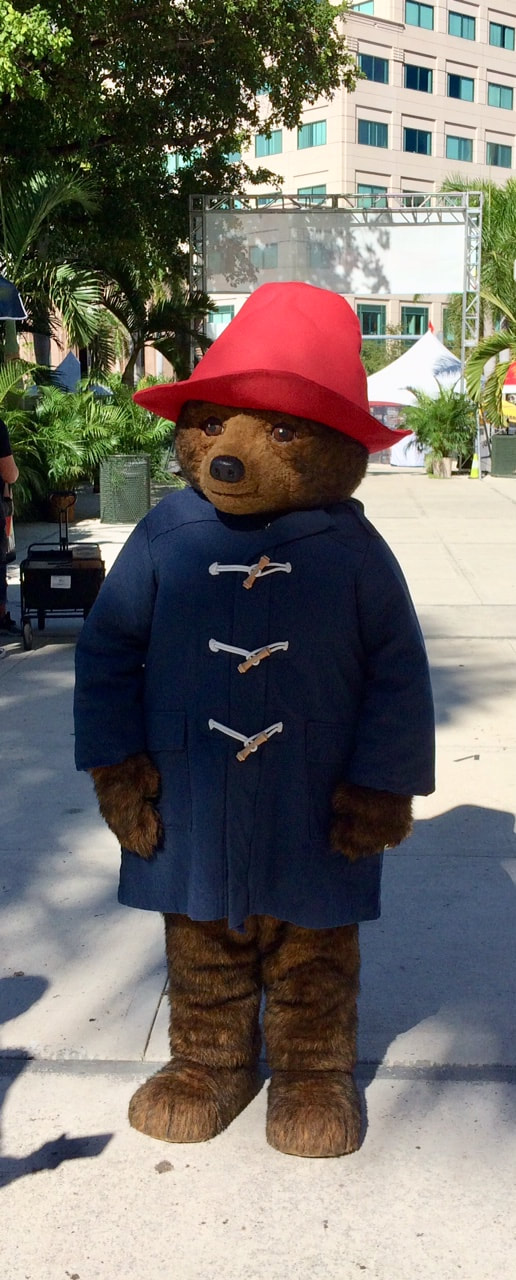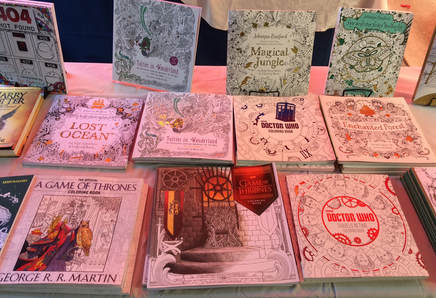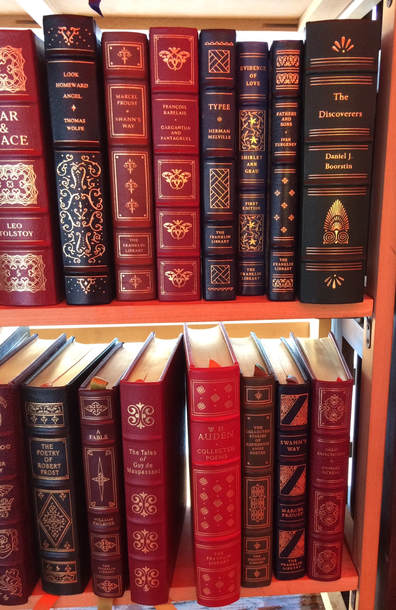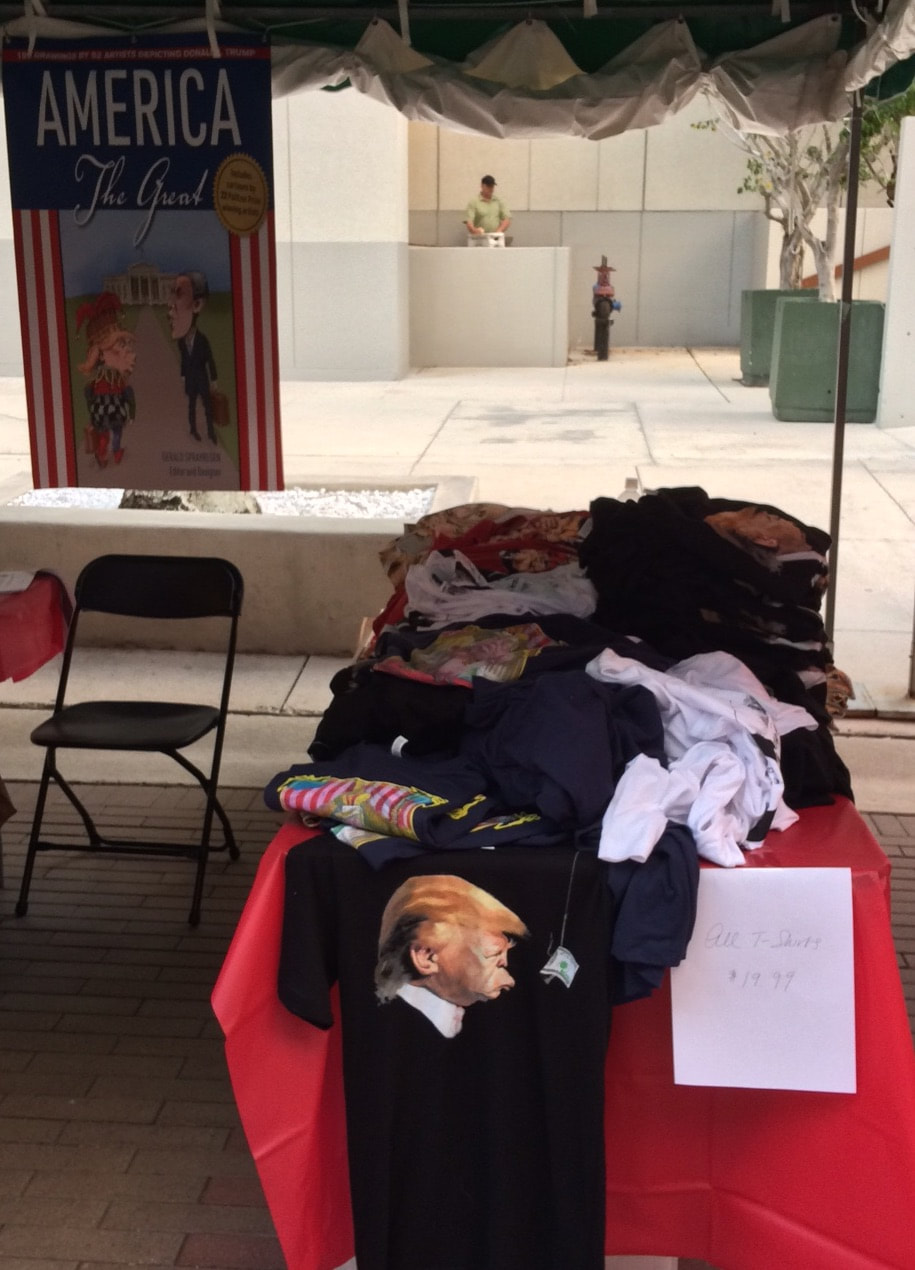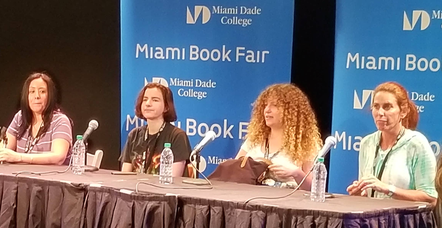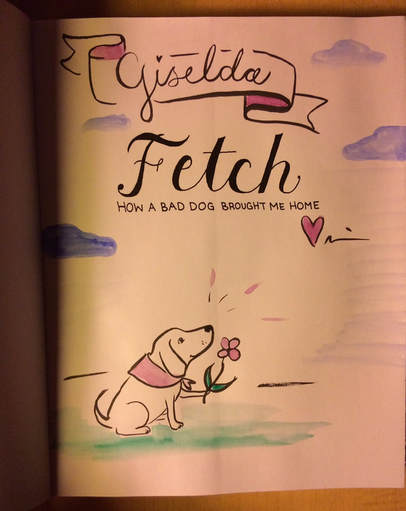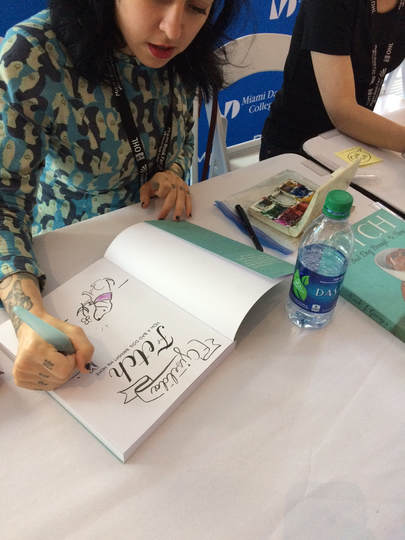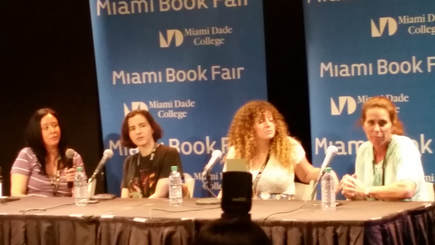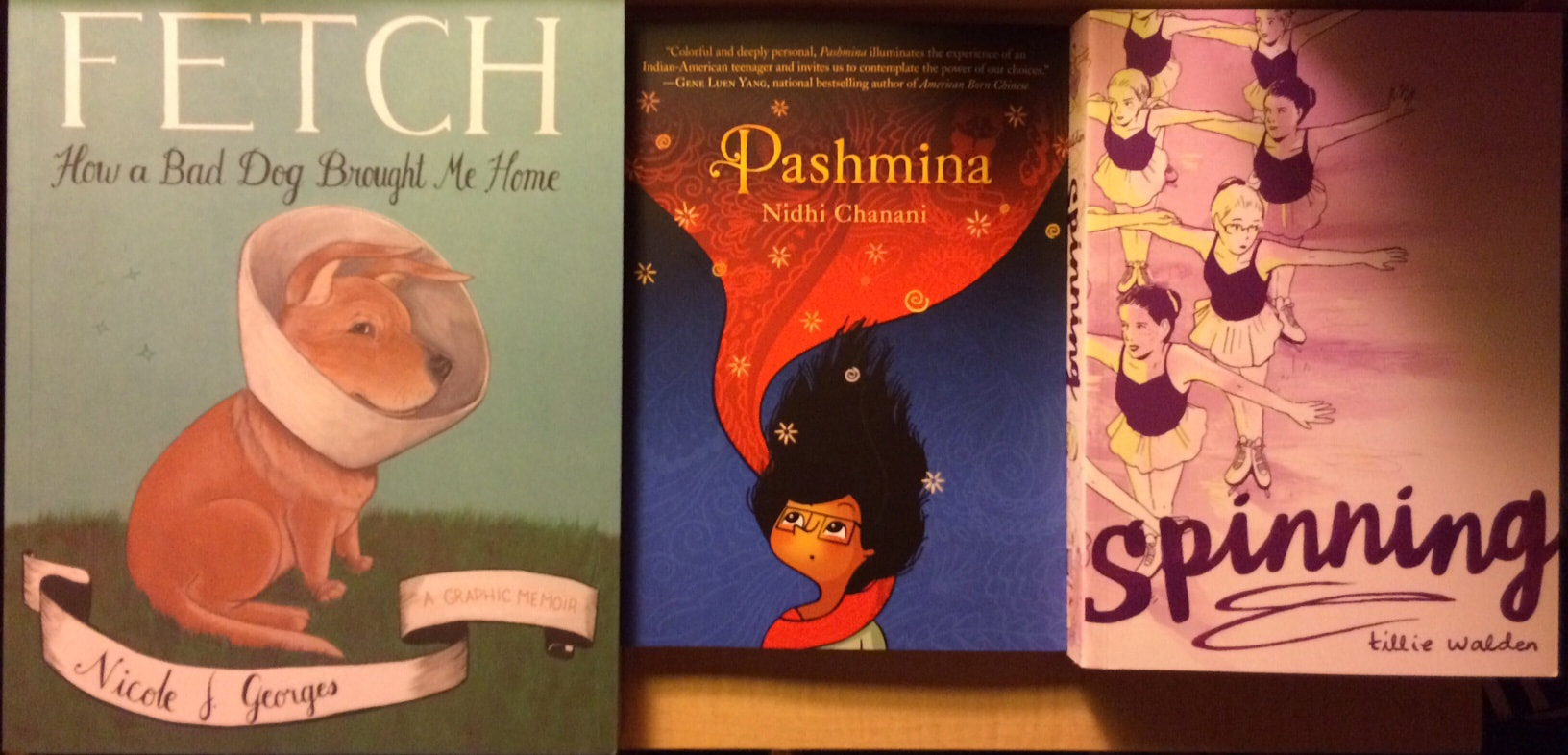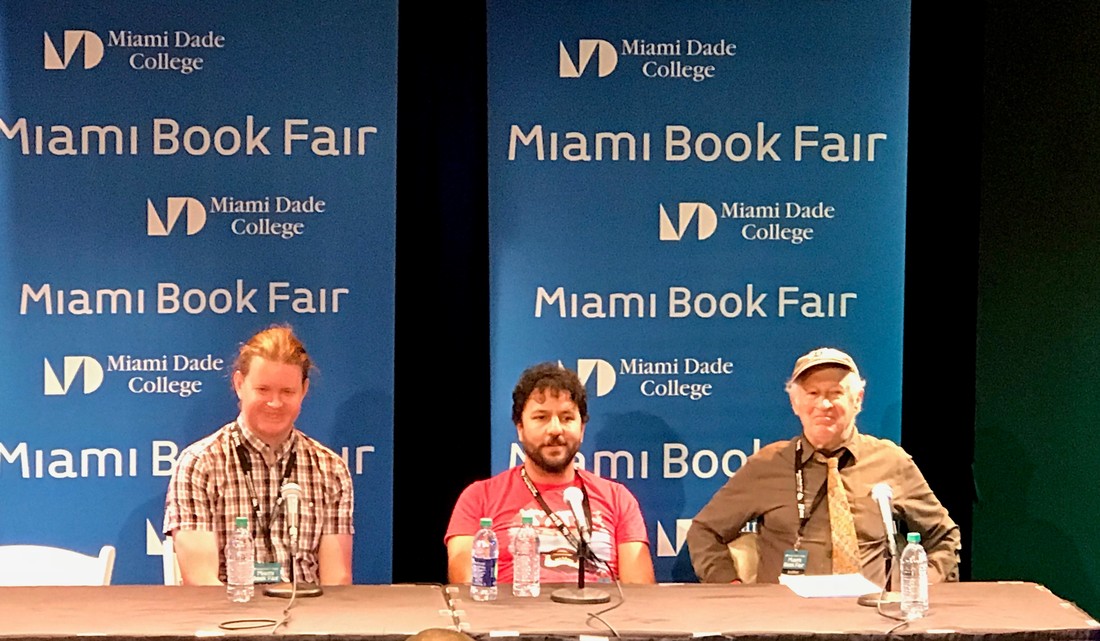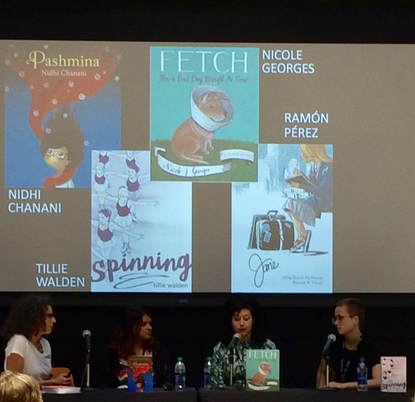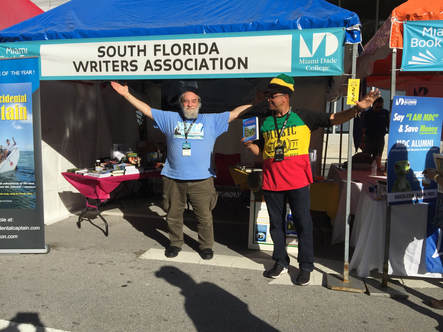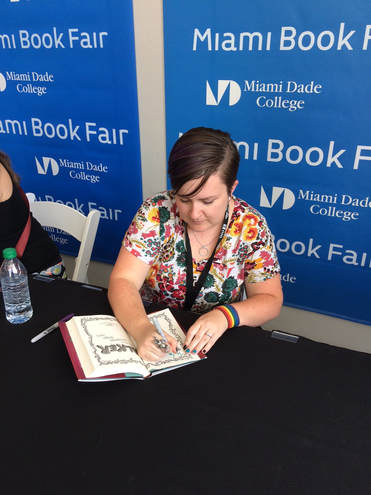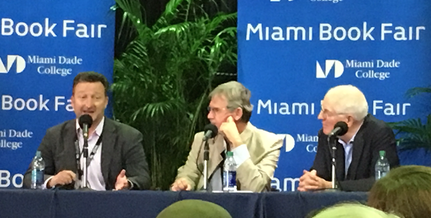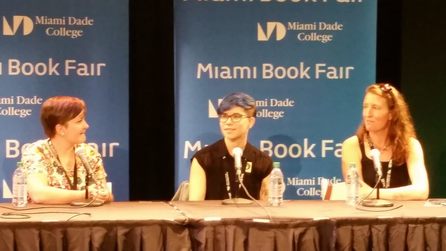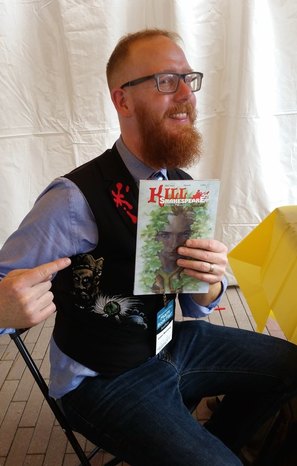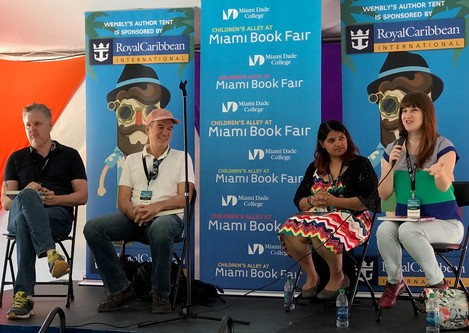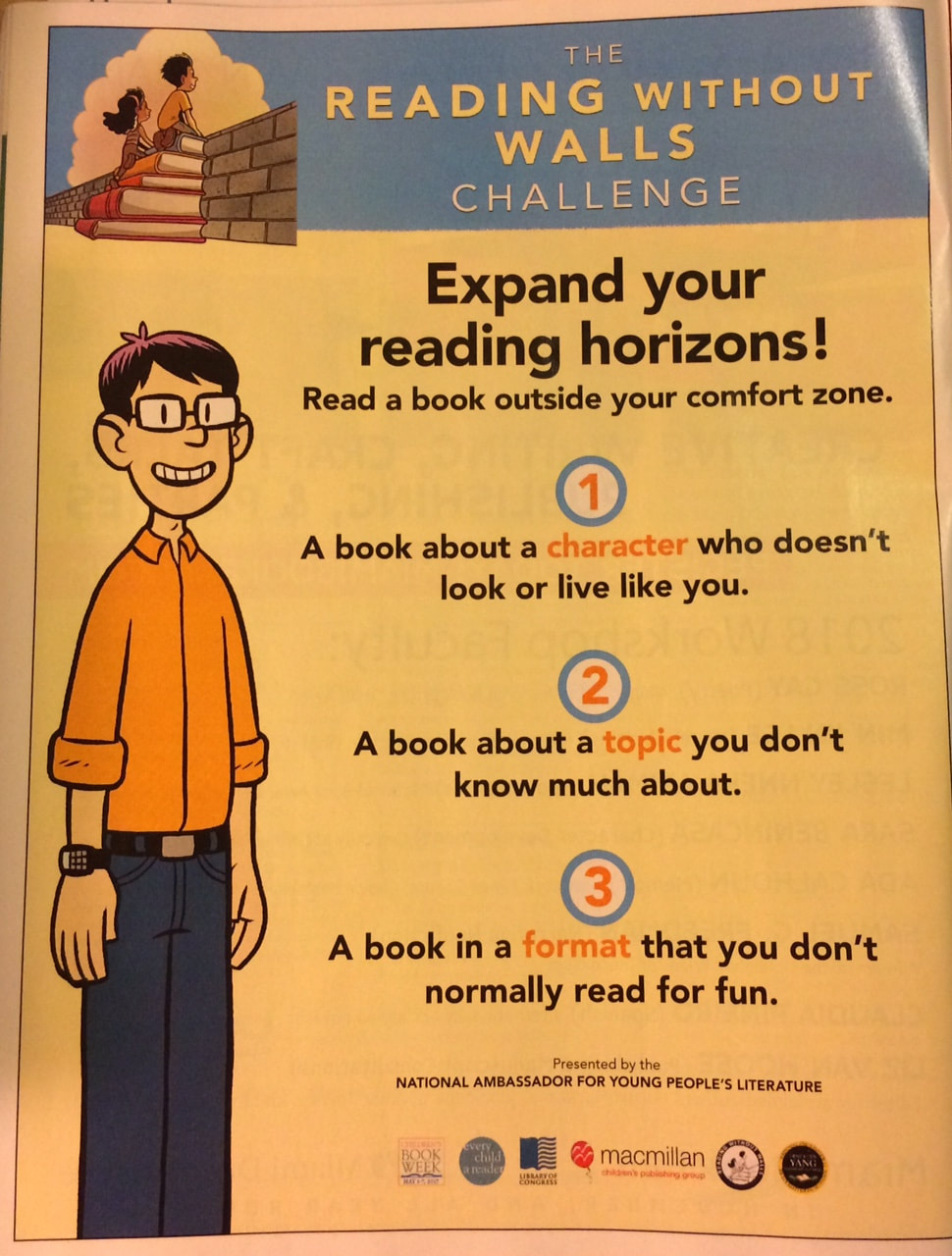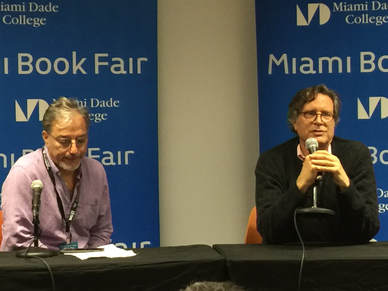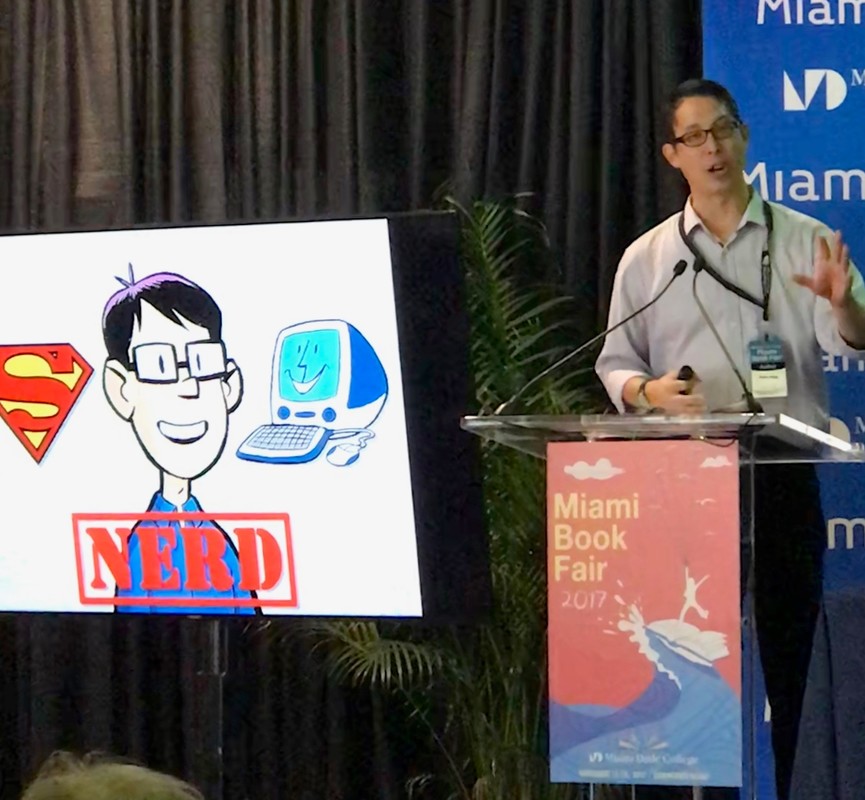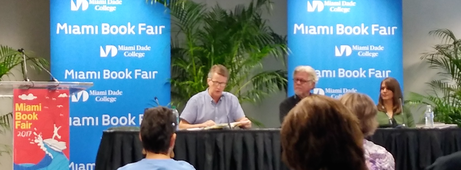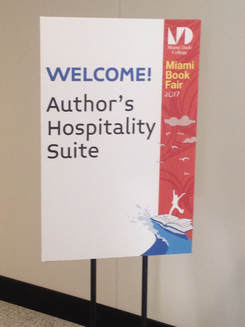Miami Book Fair 2017 Blog
Join us in person or from afar
EDITOR'S NOTE: This blog is posted with newest items at the top of the left column.
Sunday Nov. 19
Sunday, Nov. 19, 2017, 7:30 PM
Once in a while, in a spur of the moment decision, you stumble upon an authors’ panel. Maybe it was because like me you were clinging to one more authors’ session before the inevitable closing of the Book Fair. Afterwards, you’re often glad you did. That’s how I felt when I went to a panel where Joe Starita talked about his book A Warrior of the People: How Susan La Flesche Overcame Racial and Gender Inequality to Become America’s First Indian Doctor. Starita was the most passionate author I saw at the Book Fair, a man eager to talk not necessarily only about his book, a common enough trait in authors, but about the woman who inspired it. “I want people to know about this remarkable woman,” he said. “It’s a great story, not because I wrote it, but because she lived it.” Along with Starita were Marsha S. Bordner and Harold H. Brown, authors of Keep Your Airspeed Up: The Story of a Tuskegee Airman. Brown, who is 93-years-old and the book’s airman, has a gift for one liners. Here are some examples: ◇ “They won’t let you wash an airplane, much less fly one.” That’s what some people said when he was training to become a pilot. ◇ But he wasn’t discouraged: “I thought I was the greatest thing to say good morning to an airplane.” ◇ On that time he damaged an airplane when he landed: “They can always build another airplane. They can’t build another Harold Brown. They always said if you can walk away you made a fantastic landing.” The title “living legend” gets thrown around a lot, but the more I learned about Brown, the more I realized it applied to this man. He mentioned that he had been a POW for several months, but he didn’t disclose how close he got to being killed when he was captured. Then I read a story about him in The Blade by Geoff Burns. “During his 30th mission, his plane was damaged during a strafing run, a technique of attacking ground targets from his aircraft. A locomotive exploded, and [Brown] was forced to bail out of the plane over Nazi Germany,” Burns writes. “A violent group of German citizens seized Mr. Brown within 30 minutes and were going to hang him when the pilot was saved by a constable who intervened and took him to a prisoner of war camp.” Thanks to that constable, Brown survived, and seven decades later I was able to learn his story. —Roberto Manzano Sunday, Nov. 19, 2017, 6:07 PM
I’m always afraid I won’t have anything to say after a poetry event aside from generic, though effusive, praise. I forget that preparing to blog about a performance demands critical concentration, and poetry rewards that kind of attention. This is particularly true when the event in question is the Miami Book Fair’s “Two Poets Laureate: A Reading and Conversation.” Tonight featured Robert Hass and George Simic, both of whom are translators and critics as well as poets. While they reminisced, when asked, about some of the bizarre experiences they had during their terms as Poets Laureate, the focus of the evening remained on the poetry. Hass began his reading with “Okefenokee,” a poem that incorporates and rearranges several well-known tongue twisters, including Peter Piper, Sally selling shells, and rubber baby buggy bumpers. Hass stopped as he was reading and made the audience recite each tongue twisting line as he came to it. While Hass left me reveling in the joy of sound, Simic sent me home with images. He read from his new book, Scribbled in the Dark, which he claims “is about torture.” Listening to selections from it, of course, was anything but. Many of the poems Simic read were short, and their brevity seems to concentrate the meaning in the images. I was particularly struck by his description of his childhood as “an old silent movie,” and his confession that “I wrote love letters to the chickens in the yard.” —Natalie Havlina Sunday, Nov. 19, 2017, 5:55 PM
This year's list of sessions I regret having to miss is even longer than usual. Really need Hermione Granger's Time Turner on Book Fair weekend. Atop the list are the "Witchy (Wo)men: Modern Fantastical Witch Stories" panel and the session on Atlas Obscura: An Explorer's Guide to the World's Hidden Wonders. —Bob Morison Sunday, Nov. 19, 2017, 5:45 PM
Another year at the Book Fair draws to a close. This year I stuck to graphic novel and children/YA panels. I remember four years ago I was mainly going to mystery panels. I still love mysteries and, as I've said in previous years, a good story needs to have a mysterious element, something unknown. But I've realized graphic novels and children/YA panels tend to be more cheerful and funny than some of the strictly mystery genre panels, which sometimes take themselves a bit too serious. Don't get me wrong: some of the subject matters the books I saw presented this year are serious—immigration, sexual orientation, identity, the presidency—but they are conveyed through beautiful art and/or comedy. There's also a sense of hope in them. And that's what I—and many others—want right now. I'd considered seeing Chris Matthews and Van Jones, both of whom presented this year, but I thought, "Do I want to be sadder/angrier about current affairs?" I had already decided against seeing Al Franken due to the sexual allegation made against him earlier this week. In the end it didn't matter: he cancelled his book tour. Final thoughts: I loved the representation this year in the minority, queer, and women writers I saw. I will take up the challenge to Read Without Walls. We cannot be ignorant of different people, and books can help us in that goal. —Giselda Aguiar Sunday, Nov. 19, 2017, 5:31 PM
Q: What is the worst possible time for a technical malfunction? A: When the presenter is trying to play clips from classic soul records. The technician for Room 7128 eventually came up with the expedient of holding the presenter's microphone in front of the speaker of the computer displaying the slide show. Meantime, the audience was not short on entertainment. We were listening to stories and banter among a panel that included: ◇ Helene Smith—You Got to Be a Man ◇ Jackie Moore—Precious, Precious ◇ Timmy Thomas—Why Can't We Live Together We learned that Smith, the first queen of Miami soul, is a public school teacher. Moore wrote her signature song on a paper grocery bag. Thomas sang his soul anthem at Nelson Mandela's inauguration. John Capouya's Florida Soul: From Ray Charles to KC and the Sunshine Band makes the case that Florida belongs up there with Detroit, Memphis, and New Orleans as an incubator of soul music. The "Miami sound" incorporated Caribbean and Latin rhythms and instruments, and the sound spread. The book profiles 20 soul singers, musicians, and producers from or with close ties to Florida. In addition to Ray Charles (originally from Greenville) and the Sunshine Band (formed in Hialeah), the list includes Sam and Dave (first recorded in Overtown), Hank Ballard (who recorded the original "Twist" in Miami), and James and Bobby Purify (from Tallahassee and Pensacola). Plus the above named panelists. My last session of the Book Fair. Nothing like going out on a high note. —Bob Morison Sunday, Nov. 19, 2017, 5:30 PM
Sometimes there is that one author panel you look forward to all day, the one you circle in your guidebook and design your schedule around, the one that you can’t miss. In my case, that was today’s panel featuring Roben Farzad, author of Hotel Scarface: Where Cocaine Cowboys Partied and Plotted to Control Miami, in conversation with Miami filmmaker Billy Corben. Alas, I was far from the only book fairgoer with the same plan. When I arrived—ten minutes early—at the classroom where the panel was going to be held, the large crowd outside practically filled the entire wide hallway. I figured that once I got to the end of the long line, it would be impossible for me to find a space or much less a seat in the classroom. So I decided to soak up the atmosphere outside before the reading. Farzad arrived with a big smile and was holding several dress shirts on hangers. He was genuinely surprised and grateful to see the large crowd as he greeted well-wishers. Several people came up to me and asked, “Who’s this? What’s this for?” Yeah, nothing attracts the curious like a crowd. One older man surveyed the crowd and muttered, “Everybody’s into drugs.” I don’t know if he made it inside. Then there was the impatient fan, perhaps an inevitable part of any mob scene, though in this case a peaceful mob. He was annoyed because a larger venue hadn’t been reserved. “Who’s responsible for this? He’s a local celebrity.” The Fair volunteers did a commendable job of keeping their cool and politely ushering fairgoers into the classroom. By the time the reading started, all of the seats were taken and there were people standing along the back and sides of the room. The once irritated man was smiling now, standing just off to the side of the table where Farzad and Corben sat. As I left to go to another authors’ panel next door I wondered, had Farzad stumbled upon a winning formula? Did Miami plus cocaine plus the 1980s equal a runaway success? Did he know all along that there was going to be a such large audience for his book? Given Farzad’s hard work, he certainly deserved his success. According to Maria De Los Angeles’s article about the book in Miami New Times, the story of the former Mutiny at Sailboat Bay hotel and club in Coconut Grove, “consumed his spare time for more than two decades with copious research.” Although I’m a Miami native, I had never heard of the hotel—call me too young and naïve—but thanks to De Los Angeles, I learned that it “became the nerve center for Miami’s drug culture when the venue opened in 1969. It was there that the city’s lawless cocaine cowboys reigned over an era of unbridled excess heralded by a revival of the drug’s popularity in the late ‘70s.” I missed the panel I most wanted to attend, but that was okay, because that overflow crowd left me thinking. What attracted them? Were they merely curious and hungry for well-told stories about a decadent, bygone era? Or was it something deeper—a desire to somehow connect to an irrecoverable time when they were young or too young to have experienced the Mutiny or not even born? Was the former Mutiny, now a condo hotel on South Bayshore Drive, Miami’s real life version of the Eagles’ dreamy “Hotel California”? In a city not exactly known for its sense of shared history or community, maybe the old Mutiny was still a place where you could “checkout any time you like, but you can never leave.” —Roberto Manzano Sunday, Nov. 19, 2017, 5:25 PM
In previous years, at the end of the final day of the Street Fair, some booths give away their books or significantly slash prices in order to get rid of their stock. "Support Children Literacy—Books for $1" is no exception. However, after leaving my final panel and walking over to "Children Literacy" for one last time, I was shocked to see (a) a large amount of books still for sale and (b) not that many people trying to buy said books. I'd noticed there wasn't as much enthusiasm from the volunteers there this year as I'd seen in previous ones. They eventually said—to those already looking at the books and not passersby—that for $10 buyers can fill a large Miami Book Fair tote bag with as many books as possible. It was the same pitch two years ago, only it was for a $1. My sister filled up a whole bag and was given a free t-shirt. —Giselda Aguiar Sunday, Nov. 19, 2017, 4:57 PM
At "The Trump Presidential Library," Robert Sikoryak said, "People have taken the opportunity—while it's still a free country—to make art about this," referring to our current political climate. Sikoryak is anxious to go back to adapting literature and doesn't want to go back to Trump. His co-presenter, Shannon Wheeler, said he, too, was overwhelmed with the experience of creating his book. While I love the concepts of Shit My President Says (Wheeler) and The Unquotable Trump (Sikoryak), I do not want 45's face anywhere near me, let alone in my room where I keep all my books. So while I'd like to peruse both books, I'm going to pass on them. —Giselda Aguiar Sunday, Nov. 19, 2017, 4:50 PM
During the Q&A in "The Trump Presidential Library," comics from panelists Robert Sikoryak and Shannon Wheeler played in a loop on the projection screen behind them. Sikoryak said of his book, The Unquotable Trump, that "the book is beautiful, but his [Trump's] face is on every page." In answer to an audience question about cartoonists using licensed property, such as DC or Marvel superheroes as Sikoryak did in his book, he explained the fair use of licensed property. Wheeler was asked why he chose to draw Trump as a child in Shit My President Says. His response: he believes "Trump stopped maturing at age five, and he wasn't a nice five-year-old." When asked if there will be a volume 2 to his book in the future, Wheeler said that for his next Trump-related book, he would want it to be an analytical one. In the book he's promoting now, he left it to the readers to interpret it. In fact, he's had Trump supporters buy his book. —Giselda Aguiar Sunday, Nov. 19, 2017, 4:43 PM
As the end-of-Fair sales are starting, I nabbed my last deal of the day. At Bookleggers, which always has a variety of retro SF, I spotted a book called Cyberbooks by Ben Bova. Published in 1989, it foresees a world where "The book that you hold in your hands has become obsolete," replaced by electronic books. "Shop for books by TV. Buy them over the phone. Transmit them anywhere on Earth almost instantaneously, straight to the customer," the back cover tells me. I'm excited to read it now that the era of "electronic books" has arrived—although the activity at this year's Fair tells me the physical book isn't quite obsolete yet. —James Barrett-Morison Sunday, Nov. 19, 2017, 4:30 PM
At "The Trump Presidential Library," Shannon Wheeler gave his presentation on the history of political cartoons. He stated that at the turn-of-the-century, newspapers wanted to use color to do high art and educate people. It didn't work. So newspapers did cartoons instead, creating yellow kid comics, cartoons that were racist towards the Irish. Eventually, these comics led to yellow journalism: cartoons were taking up space and headlines were made larger. As Wheeler put it, it was like "click-bait." Wheeler stated political cartoons are the "canary in the coal mines." He mentioned MAD Magazine, National Lampoon, and Spy Magazine. He started making political cartoons about Trump after he won. For instance, in one comic, Wheeler drew a closed door and underneath it added Trump's tweet, "Signing my tax return...." He combined his Trump cartoons in Shit My President Says. —Giselda Aguiar Sunday, Nov. 19, 2017, 4:18 PM
Robert Sikoryak from "The Trump Presidential Library" panel is an absurdist and said, "This president, um, inspired me?" which caused the packed room to laugh. Sikoryak, a political satirist and comic book fan, gave a slideshow presentation about the history of U.S. presidents in DC and Marvel comics, explaining there's always been a "push and pull between politics and comics." He brought up the X-Presidents skit SNL ran in the early 2000s. His way of coping with Trump winning the presidency was to imitate the Tea Party Comix by compiling Trump quotes—things Trump has said out loud, not tweeted—and combining them with comic book covers. For example, Sikoryak took Trump's "he's not a war hero" comment about John McCain being a prisoner-of-war. Sikoryak thought of Captain America and replaced Red Skull smashing Captain America with Trump smashing the Captain while saying his "he's not a hero" quote. Sikoryak found the experience of creating The Unquotable Trump "satisfying" not "fun." His book tracks Trump's progression from candidate to president. —Giselda Aguiar Sunday, Nov. 19, 2017, 4:05 PM
The room for "The Trump Presidential Library" panel is PACKED. People are standing along the walls. The audience is mainly an older, white crowd. And don't let the title fool you: this panel promises laughter at the expense of the president. —Giselda Aguiar Sunday, Nov. 19, 2017, 3:50 PM
"From Book to Film: The Man Who Invented Christmas" was a celebration of the release of a major movie. And of Book Fair co-founder Mitchell Kaplan and the success of another of his entrepreneurial endeavors. And of Les Standiford, director of the creative writing program at FIU, whose book (same title) provided the story of how Charles Dickens overcame monumental writer's block and rejuvenated his career by writing A Christmas Carol. Kaplan hosted a discussion among Standiford, co-producers Paula Mazur, Robert Mickelson, and Ian Sharples, and director Bharat Nalluri. They talked about the "anatomy" of making an independent film, the nine years it took, the various points when the project almost stalled, and the magical realism that makes the film special. In the end, "This movie was too good not to make." Kaplan also showed the movie trailer and a behind-the-scenes video with comments from the principals. Posters were distributed outside the venue. The Man Who Invented Christmas, starring Dan Stevens (as Dickens), Christopher Plummer (as Scrooge) and Jonathan Pryce (as Dickens' father), opens nationwide on November 22. A Christmas story of a literary bent. —Bob Morison Editor's note: You can watch the trailer for The Man Who Invented Christmas below! Sunday, Nov. 19, 3:45 PM
The Man Who Invented Christmas panel was listing all the countries where the film is about to be released. Director Bharat Nalluri jumped in: "Don't forget Italy. The film sounds so great in Italian—Scrooo-ja!" —Bob Morison Sunday, Nov. 19, 2017, 3:43 PM Les Standiford, author of The Man Who Invented Christmas: "Who would have thought that they could make a movie from a book about a guy writing a book?" And when asked whether the writing process is as difficult as depicted in the book: "Writing is a mixture of hopefulness and torture." —Bob Morison Sunday, Nov. 19, 2017, 3:18 PM
Sunday afternoon and the Street Fair is hopping! I'm writing this blog while waiting in a long line for coffee. Fortunately, the people watching is good, the weather is beautiful, and the air is humming with positive energy. I love seeing so many people out for love of books! —Natalie Havlina Sunday, Nov. 19, 2017, 3:16 PM
Walking away from Oasis Raspados with my delicious strawberry-banana drink, a woman at a KIND Healthy Grains booth gave me a free Cinnamon Oat bar. These small booths are set up in several places throughout the Fair and are giving away free samples. I made my way to the "MDC Literary Magazine" tent because some friends had volunteered there yesterday, and I'd promised I'd stop by. They're giving away free copies of Café Cultura and Miambiance. —Giselda Aguiar Sunday, Nov. 19, 2017, 3:07 PM
Stopped by Oasis Raspados, a tiny truck that sells shaved ice with natural juices and topped with pieces of fruits. You get the option of two fruits and whether you want ice cream and/or condensed milk on top. I picked strawberry and banana with condensed milk. Best. Decision. Today. —Giselda Aguiar Sunday, Nov. 19, 2017, 2:50 PM
If you’re a solar eclipse chaser and live in Florida, you’re in luck, as long as don’t mind waiting almost 30 years for the next one. A total solar eclipse will occur on December 12th, 2045 and cross Florida, according to David Baron, author of American Eclipse: A Nation’s Epic Race to Catch the Shadow of the Moon and Win the Glory of the World. “Put it down on your calendar,” he said. “The place to be will be Port Saint Lucie. It will last six minutes, which is a really long solar eclipse.” —Roberto Manzano Sunday, Nov. 19, 2017, 2:44 PM
Florida Histories panel looked to be taking its full 90 minutes, and I had a must-see 3:00 session. So I couldn't wait around to ask Bob H. Lee to sign my copy of Bad Guys, Bullets, and Boat Chases: True Stories of Florida Game Wardens. But you can read my review on The Florida Book Review's Nonfiction page. —Bob Morison Sunday, Nov. 19, 2017, 2:38 PM
“Friends of Miami-Dade Public Library” is selling paperbacks for $1 and hardcovers for $3. They’re also giving out cute pet bookmarks with any purchase. Their annual book sale at the main library—in downtown Miami—is December 13-16, 2017 from 9 AM to 5 PM. —Giselda Aguiar Sunday, Nov. 19, 2017, 2:30 PM
In the 1975 film Three Days of the Condor, Joseph Turner (Robert Redford), a CIA researcher whose coworkers are gunned down by assassins, wonders if a report he submitted to headquarters unnerved what he calls an unaccountable “CIA within the CIA.” I thought of Turner’s suspicion during Jefferson Morley’s discussion of his biography The Ghost: The Secret Life of CIA Spymaster James Jesus Angleton. Morley said that those who knew him described Angleton as part Machiavelli, part Svengali and part Iago. One man described him as a “collection of angles” and the “most sinister man” he’d ever known. While biographers generally look for a subject who left behind a trove of letters and diaries, Morley said he embarked on an “investigative biography” about a man who left no papers and tried to cover his fingerprints. So Morley had to visit presidential libraries and scour universities’ archives for information about Angleton. Why did Morley think readers should still care about Angleton, who was the CIA’s counterintelligence chief for two decades, beginning in the mid-1950s, and who died 30 years ago? The author said that given all of the talk of a so-called “deep state” in the national political discourse lately, Angleton remains a relevant “founding father of the secret agencies.” Morley reminded the audience that the U.S. government’s enormous national security apparatus includes more than the famous CIA. Others include the National Geospatial-Intelligence Agency, the National Security Agency, and the National Reconnaissance Office. According to Morley, the American government’s secret sector has an annual budget of roughly $50 to 60 billion. Angleton, a Yale graduate, left Harvard Law School in 1941 to join the Office of Strategic Services (the CIA’s predecessor). Morley said that the spy chief was fluent in French and Italian and had a “creative literary bent that he applied to espionage.” (Who says a liberal arts education isn’t practical?) As the CIA counterintelligence chief, Angleton worked under four American presidents. According to Morley, Angleton found Dwight Eisenhower “stodgy”; John F. Kennedy “charismatic but weak”; and Lyndon Johnson “crude.” His favorite was Richard Nixon, who he thought well prepared to fight communism. During his long tenure, in the name of national security, Angleton began to violate Americans’ rights through mass surveillance. In an interview with David Murrell at the Washingtonian, Morley said that “Angleton wanted to get information about what Americans were saying and thinking in their dealings with the Soviet Union. So he opened every single piece of mail that went from the United States to the Soviet Union, coming or going. He was opening 10,000 letters a year. Before that, nobody dared open the mail. It was plainly illegal under U.S. statute. But Angleton did it.” In the wake of revelations of illegal CIA activities, Angleton was forced to resign in 1974. Morley explained in the same interview that Angleton had used his position to “build an empire of his own, really to build a CIA within the CIA. His activities were even secret from the CIA itself.” —Roberto Manzano Sunday, Nov. 19, 2017, 2:11 PM
I was looking forward all day to getting a crêpe from the stand in the food court, to fortify myself before tackling the Street Fair bargains—and it's not there! An institution (of at least five years, based on our Book Fair blogging archives) is gone. Ah well, guess I'll have to settle for an arepa. —James Barrett-Morison Sunday, Nov. 19, 2017, 2:01 PM
After securing a shaded bench and sitting there for half an hour or so, my sister and I decided to have lunch. In order not to lose this precious shaded area with a smoothing breeze from the large fountain behind us, I volunteered to get the food while the other waited. But when I returned with our Thai food and icy cold bottles of water, the sun had moved past the trees and was burning up our former precious bench. I spotted another, still shaded bench and moved towards it, realizing as I did so that there was an empty table in the shade as well. The Florida sun is cruel. —Giselda Aguiar Sunday, Nov. 19, 2017, 1:58 PM
I always make sure to see one SF panel per Fair, to break up my normally nonfiction-heavy panel schedule. This year, it was a three-man panel about the boundary between SF, comics and politics called Future Shock! Mike Cavallaro's new comic with playwright Adam Rapp (not present), Decelerate Blue, is inspired by the lack of presence engendered by modern technology. The pair created a future world where fast-paced multitasking is paramount, and a girl who rebels from it by slowing down. Michel Fiffe's Zegas is a surrealistic, colorful comic about two siblings' adventures growing up in an invented city. And political cartoonist Mr. Fish (a pseudonym) released a collection of cartoons and essays aiming to reach the "humanitarian center" that is neither right or left, increasingly isolated in a partisan age. The moderator, George O'Connor, created a mini-show featuring artwork from the books. The stark, punk-inspired black-and-white of Decelerate Blue contrasted well with Zegas' bright, in-your-face art. And Mr. Fish's cartoons really made a splash with the audience, especially his mashups of old-school fandoms (like Star Wars) with modern political themes. —James Barrett-Morison Sunday, Nov. 19, 2017, 1:18 PM
I really like fiction sessions that feature the right mix of reading and discussion by accomplished writers. Laura Lee Smith said, "We're always hooked by story. We're story addicts, which is why we're at the Book Fair." The seeds of her story in The Ice House come from her grandfather's immigration to America and all that he left behind. Set in Florida and Scotland, the book is about marriage and parenthood, and "a family who love each other even when they don't want to." She read the opening section where the ice house owner awakens with headaches, physical and familial. C. Morgan Babst's The Floating World: A Novel is a Hurricane Katrina story "at a very individual level—one family, one house, one death." Babst evacuated the day before the storm, "and then spent a decade in New York writing my way back to New Orleans. All the news and data after Katrina were so numbing that I needed fiction to tell the full story." She read a section about how the Mississippi tries to decide where it wants to flow and how the family tries to decide to evacuate before the storm. —Bob Morison Sunday, Nov. 19, 2017, 1:05 PM
Second time today I had to leave a panel before it ended to get to the next one. I took a minute detour—maybe not even that long—to buy a small popcorn bag, but when I arrived at the “Rescue Missions and Other Worlds” in Children’s Alley, a Fair official stood by the entrance of the Wembly tent, a rope blocking passage. “It’s full?” I asked. “It’s packed,” the woman said. So now I’m on a bench under the shade eating popcorn and trying to figure out what to do next. —Giselda Aguiar Sunday, Nov. 19, 2017, 12:58 PM
Most entertaining author self-assessment of the weekend was C. Morgan Babst's, "My book ends up being a sort of turducken." —Bob Morison Sunday, Nov. 19, 2017, 12:52 PM
Chantel Acevedo is glad her chosen historical figure, Princess Eulalia from Spain, left an extensive written record. It was easy for her to imitate the princess's voice, even in another language. —Giselda Aguiar Sunday, Nov. 19, 2017, 12:50 PM
While at "Fiction: Readings from New Works," I noticed one of the Fair's mascots through a glass door that led down a hallway with three chairs. The man in the mascot suit was sitting—presumably cooling off in the air-conditioned building—with his handler. His mascot head was on the ground. —Giselda Aguiar Sunday, Nov. 19, 2017, 12:40 PM
Stopped in briefly at the Environment and Our Future panel at noon. Prosecutor Alan Bell (Poisoned), who I was most excited to see, was a no-show. Bummer! Oceanic environmentalist Marcus Eriksen worked for years documenting the smog of plastic particles that have accumulated in the world's oceans. His new book, An Ocean Voyage and Rising Tide of Activism to Fight Plastic Pollution, covers one of his many scientific voyages. In this one, he and a companion built a raft out of garbage (plastic bottles for flotation, torn fishing nets and the body of an abandoned Cessna airplane) and sailed it from California to Hawaii. Eriksen had been instructed to fill the time, and I had to duck out, so I also missed Pope Brock read from Another Fine Mess: Life on Tomorrow's Moon. I hope the audience enjoyed! —James Barrett-Morison Sunday, Nov. 19, 2017, 12:39 PM
At their panel, Chantel Acevedo, Cristina Gracía, and Pablo Medina read excerpts from their newest books. Acevedo's The Living Infinite is told from the perspective of Princess Eulalia (1864-1958) from Spain. Acevedo read two sections, one being Eulalia's "I want song"—as seen in any musical—and the second being when Eulalia discovers her husband is cheating on her. Gracía read parts from two different stories in Here in Berlin, a series of first-hand accounts told to a traveler in Berlin. The first piece she read was about a kidnapped watchman and the other was from a former German Minister of Culture. Afterwards, Gracía said she completely made up the stories, which was disappointing because I'd assumed that like Acevedo's historical fiction, Gracía was dealing with real people whose stories she merely embellished, especially because she said she'd gone to Berlin to do research and "collected" these stories, à la Brothers Grimm. Medina's translated work, The Kingdom of This World, takes place in Haiti during its revolt for independence. The story has historical figures. —Giselda Aguiar Sunday, Nov. 19, 2017, 12:20 PM
Got to the the Friends of the Fair hospitality suite in time to catch the end of the Van Jones session on Beyond the Messy Truth: How We Came Apart, How We Come Together. Made me think about the conviction and courage it takes these days to be a sensibly minded and vocal public figure. The C-SPAN cameras followed Jones from the auditorium through an appreciative crowd to the photo-op with Dr. Eduardo Padrón (Miami-Dade College president and co-founder of the Book Fair), and then to the book signing area, where each autograph was clearly a personal connection. —Bob Morison Sunday, Nov. 19, 2017, 12:15 PM
There is no moderator at the "Fiction: Readings from New Works" panel, so, to start, panelist Cristina Gracía pointed out that all three books—Chantel Acevedo's The Living Infinite, Pablo Medina's translation of Alejo Carpentier's The Kingdom of This World, and Gracía's Here in Berlin—deal with history. Because he had to do research on the time period his source material is set in, not to mention that it deals with a different culture than his, Medina said, "I almost became Haitian" due to the amount of research he conducted. He also stated that it took him 40 years "to be ready" to translate Carpentier's book, which he'd read in Spanish in college. Acevedo also got lost in her research. She had turned to "Professor Google" when she heard the story about Spanish Princess Eulalia going to Cuba; wearing the blue, red, and white rebel colors; and refusing to change after her husband told her to. Gracía had gone to Berlin to do research for another project, but nothing came of it, so she collected other stories, "portals." She had collected about 100 and dwindled them down to about 30 for her book. Explaining further some of the research involved in translating, Medina described a moment in the book that mentions salt. In his research, he discovered that in voodoo, salt is needed to create a zombie. He thought of explaining this in a footnote, but if he did that every time, "the book would be three times longer." —Giselda Aguiar Sunday, Nov. 19, 2017, 11:59 AM
Best fairgoer T-shirt of the day so far reads, "Make America Smart Again." —Bob Morison Sunday, Nov. 19, 2017, 11:58 AM
The panelists at the Future of the Library panel are discussing the library's role as a center of information access in the era of "fake news." Miami-Dade Public Library, Ray Baker says, has begun providing training on distinguishing real and fake information sources. Meredith Schwartz adds that it's long been part of a librarian's job to teach media literacy: not just "to help someone find the needle in the haystack" of information, "but to teach them to sort through the haystack themselves." She ends by saying that libraries shouldn't shy away from political topics: "it's better to offend someone than to be irrelevant." —James Barrett-Morison Sunday, Nov. 19, 2017, 11:57 AM
Sales beginning early. Old Florida Book Shop booth has all books on sale for $1.00. It's not even noon. Most prices drop around 3:00. —Bob Morison Sunday, Nov. 19, 2017, 11:55 AM
"Horror, Noir, Immortality," drawing to a close, touched on the power of images. Victor LaValle mentioned the movie Elephant and how he learned, as a prose writer, that things don't have to be over-explained; how a single image can convey so much. In reply to an audience question, LaValle restated that he returned the violence present in Mary Shelley's Frankenstein to Destroyer, but removed all the talking in the creature. He explained that talkative monsters aren't scary. He does wish he could've kept the monster's desire to seek love, but thought it would be unrealistic after the creature lived 200 disillusioned years. Another audience member asked the panel's opinion on the future of comics. Conor McCreery mentioned the possibility of digital membranes that would recreate the sensation of a physical comic. He said that "singles" (issues) don't sell as well because people what to buy the book/volume. Unfortunately, I wasn't able to stay to hear any other Q&A since I needed to go to my next panel. —Giselda Aguiar Sunday, Nov. 19, 2017, 11:52 AM
The good news is that panels on the Sunshine State often feature the variety of slide shows. The bad news is that some presenters haven't timed their shows to fit the schedule. James A. Kushlan and Kirsten Hines ran over presenting Biscayne National Park, but the pre-park history is fascinating. Some Upper Keys landowners tried to incorporate the town of Islandia as a vehicle for opposing formation of the Park. Those on Elliot Key tried to make the island a less attractive acquisition by destroying the hammock along the island's spine to form a six-mile "spite highway." The book, with text by Kushlan and contemporary photos by Hines, was commissioned as part of Biscayne National Park's 50th anniversary. Jen Karetnick got the session back on time with a crisp discussion of 500 Hidden Secrets of Miami. 500 is a lot, so the book is organized into where to eat, drink, shop, sleep, what to discover culturally and historically, things to do with kids, the usual categories. But then to make things really specific and accessible, there are lists of five, such as "The five best places for stone crabs without having to wait." The book is part of a series published in Europe, the first three U.S. cities covered being New York, Los Angeles, and Miami. Karetnick said that many of the entries are not secrets to Miamians, of course. But there are discoveries for all of us, often right around the corner. [Editor's note: You can read our reviews of Karetnick's poetry collection, American Sentencing, and cookbook, Mango, on our site.] Terri Mashour's Backcountry Trails of Florida is a hiker's guide to many of the little known, out of the way, seldom traveled, and sometimes hard to find trails on public lands.They're grouped regionally by Florida's five Water Management Districts. The slide show, however, had outdoor scenes from Mashour's job in one of the Districts, not from the trails. Will have to find out for myself. —Bob Morison Sunday, Nov. 19, 2017, 11:31 AM
As a Woody Allen fan, I knew I would get a welcome fix of Allen trivia during a conversation between Jim Shepard and Eric Lax, author of Start to Finish: Woody Allen and the Art of Moviemaking. Thanks to Lax, who has written four books about Allen, I learned about how the filmmaker works. For one thing, he doesn’t like rehearsals. He also says little to his actors beyond, “Say it naturally.” I also learned of an exchange Allen had with the late Sam Shepard: Allen: Read it that way. Shepard: I can’t read it that way. Allen: Why not? Shepard: If I read it that way, I’ll sound Jewish. However, according to Lax, Allen will often say that a problem with an actor’s performance is in “the writing—not in the delivery.” For Allen, who knows a thing or two about comedic timing, “the important part of a joke is not the punch line, it’s the straight line.” When someone in the audience asked Lax what he thought were the common themes in Allen’s movies, Lax mentioned two. First, love is unpredictable. Second, we live in an uncaring universe. So as Allen sees it, he said, you can get away with murder and not be punished, assuming a guilty conscience doesn’t torment you. Thinking about those pessimistic themes gave me another way to appreciate Allen. As someone who’s laughed so much thanks to repeated viewings of Annie Hall over the years, I realized there is an inescapable darkness in Allen’s genius as well. —Roberto Manzano Sunday, Nov. 19, 2017, 11:30 AM
When speaking about immortality at the "Horror, Noir, Immortality" panel, Jason Shiga said he thinks a lot about death—and suicide. That second part caused an awkward silence among the audience. Eric Grissom, however, added that when he's on a high place, he has "an instinct to jump." What? Victor LaValle said that when his wife went through birth labor, she described it as being "closest to death," her life at an edge, pulling her new child to her. —Giselda Aguiar Sunday, Nov. 19, 2017, 11:28 AM
When checking my schedule this morning, I saw a panel on the Future of the Library, and new I had to see it. Christopher Kenneally of the Copyright Clearance Center hosted, starting with the dual questions: why do we have libraries, and how are they changing? Ray Baker, the new director of the Miami-Dade Public Library system, started by discussing the shift from libraries as "book repositories" to include digital, audio, and other materials. He focused on the expanding local support for libraries in the last few years; library advocate John Chrastka contrasted the large support for libraries at the ballot box with often strong opposition from local governments, hell-bent on reducing social services like the library. Meridith Schwartz, director of Library Journal, told the story of the Ferguson library, which remained open throughout the unrest there in 2014. By keeping its doors open, it quickly became a community hub and attracted huge local and nationwide support as a result. Andrew Albanese, senior writer at Publisher's Weekly, gave us an update on the back-and-forth of library funding out of Washington, DC—the Trump administration's recent attempt to defund all federal support for libraries and museums has been met with pushback from Congress, but the end result is still unknown. Us library lovers will have to keep our eyes on the situation! —James Barrett-Morison Sunday, Nov. 19, 2017, 11:26 AM
The "Horror, Noir, Immortality" panel discussed finding the right collaborator, since three of them—Victor LaValle, Eric Grissom, and Conor McCreery—write their comics and work with an artist who illustrates. Grissom (Gregory Suicide) said that he wants one thing when he writes the script and hands it to the illustrator, but that person has their own thoughts. The moderator, Alex Segura, asked Grissom if he over-explains in his scripts, to which Grissom replied that at first when he doesn't know the artist, he does over-detail things. McCreery (Kill Shakespeare) added to trust the artist, "because they're geniuses." Jason Shiga, who is the writer and illustrator of Demon, said, "I hate collaboration," which caused the other panelists and the audience to laugh. —Giselda Aguiar Sunday, Nov. 19, 2017, 11:20 AM
The Florida-themed sessions in Room 7128 always draw a crowd. But even all the body heat can't raise the temperature in that frozen venue. Next year, I want to run a sweater and sweatshirt concession outside the door. —Bob Morison Sunday, Nov. 19, 2017, 11:17 AM
Jason Shiga (Demon) stated at the "Horror, Noir, Immortality" panel that he came late to reading comics, having read his first one in college: Maus. I got a little excited hearing this because my first experience reading graphic novels was Maus in college, too! Shiga's message: "It's never too late." Victor LaValle had read comics when young, but stated the first one to make an impact on him was X-Men: God Loves, Man Kills, with its political aspect dealing with a prosecuted minority. He liked that the comic treated him as an intelligent being who can understand the conversation. —Giselda Aguiar Sunday, Nov. 19, 2017, 11:15 AM
Conor McCreery, at the "Horror, Noir, Immortality" panel, stated he got the idea for Kill Shakespeare after the success of the Kill Bill movies. He thought of a series of Bills getting killed, finally settling on "Billy Shakespeare." As he pointed out, Shakespeare has a long history of being re-imagined. Fellow panelist Victor LaValle, who's promoting Destroyer, a continuation of Mary Shelley's Frankenstein set 200 years later, said he didn't re-imagine Frankenstein, but returned the story to the original source: making the monster cruel as he is in the novel instead of a misunderstood creature as seen in various movie adaptations. However, having taught it many times, LaValle is aware many people haven't read Shelley, so he says in his comics some things are from the novel, when in fact they aren't. —Giselda Aguiar Sunday, Nov. 19, 2017, 11:12 AM
Time for a poetry panel, and this one was superb. Herewith the poets and a favorite line or two from each. Jim Daniels read from his latest books, Rowing Inland (in the general direction of his hometown of Detroit) and Street Calligraphy. "Life is mostly a series of rhetorical questions" on a slow-paced family vacation. This wasn't couched as advice to poets, but it is: "If you look at anything long and hard enough, it catches fire." Michael Hettich read from The Frozen Harbor. A poem on the Milky Way describes "vanishings we witness but do not see." And an elegy on climate change says, "We're learning to say goodbye to everything we love here in Miami." Anne Marie Macari read from Red Deer poems rooted in her exploration of caves and their paintings in southern France and Spain, while "we live on the surface." "Some things abhor light, and I almost understand them." Patrick Rosal acted as well as read his poems from Brooklyn Antediluvian. From a typhoon poem: "Everywhere there used to be a river, there's a bigger river now." And ending on an optimistic note: "Sometimes sadness is just what comes between the dancing." —Bob Morison Sunday, Nov. 19, 2017, 11:11 AM
Conor McCreery, no stranger to the Miami Book Fair, is at the "Horror, Noir, Immortality" panel. As co-creator of the Kill Shakespeare series, he described his comics as the product of Shakespeare and Game of Thrones having a drunken night. I noticed McCreery has what appears to be blood splatter printed on his vest's lapel, reminiscent of the blood splatter on the cover of Watchmen. I'm sitting too far to tell, but if I'm right, the literary allusion wouldn't be out of place at a graphic novel panel. —Giselda Aguiar Sunday, Nov. 19, 2017, 11:06 AM
Turns out this panel on the Future of the Library is being recorded, and will be tomorrow's episode of the Copyright Clearance Center's "Beyond the Book" podcast, normally hosted by two of the panelists, Christopher Kenneally and Andrew Albanese. Us audience members better be on our best behavior—we're on tape! —James Barrett-Morison
Sunday, Nov. 19, 2017, 10:15 AM
The “MDC Campus Store Follett” has everything 25% off. They have a large collection of coloring books. “MVP Collectable Books, Comics and Toys” has comics for $1 and a large selection of Funko Pop figurines. —Giselda Aguiar
Sunday, Nov. 19, 2017, 9:30 AM
Writers' Row was not yet full of people promoting their books early on a Sunday, but I was already offered a choice of titles to help me get my act together: 28,000 Days. . . Make Yours Count, The Invitation to Your Life: Internal Nourishment for the Soul, Poetic Ramblings of a Hopeful Heart, and what I need most, C.U.R.E. Cultivating Unlimited Rejuvenating Energy. I'm a fan of shorter titles, though. The '49 Indian features the classic motorcycle. Rise and Fall does not specify the subject, but it's a classic plot. —Bob Morison Saturday Nov. 18
Saturday, Nov. 18, 2017, 5:00 PM
My sister and I bought cherry snow cones and are eating and chatting of the 3 o'clock panels the other missed. I had debated going to the "Wonders from the Past: Historical Fictions and Truths" panel, and it sounds interesting from what my sister has said, but I opted for the "Women Wanderers" panel instead. Funnily enough, I bought all three books discussed in the panel I went to and my sister bought all three books from the one she went to. —Giselda Aguiar Saturday, Nov. 18, 2017, 4:36 PM
Julie Shepard, Maggie Thrash, and Lynn Weingarten provided insights that should be helpful to a number of aspiring writers at today’s “Mystery, Murder and Deception: Page-Turning Suspense Thrillers” panel. The authors described their own, very different writing processes and gave some easily digestible tips about writing mystery novels. What really made this panel stand out for me, though, is the authors’ courage. Their work explores dark topics. Not everyone has the guts to “go there.” Shepard, Thrash, and Weingarten not only encouraged us to “go as dark as you want,” but empowered us to do so by their example. They accept that, as Thrash nonchalantly put it, half of her readers “are going to think I’m a psychopath.” Shepard, Thrash, and Weingarten clearly don't let fear of judgment stop them from bringing their readers exciting stories. —Natalie Havlina Saturday, Nov. 18, 2017, 4:31 PM
At the "Mystery, Murder, and Deception" panel, another audience member asked the panelists how they write intimate scenes. Julie Shepard said that being conservative, she believes less is more in the description. Lynn Weingarten stated there isn't a right way to tackle such scenes. —Giselda Aguiar Saturday, Nov. 18, 2017, 4:30 PM
The "Mystery, Murder, and Deception" panel wraps up with a brief discussion of casting their characters in movies during which Thrash brings up Carry Grant, Catherine Hepburn, and Jimmy Stuart, and a brief mention of future projects. Thrash is working on graphic novels and Shepard is in the process of sending out a new mystery. —V. Calderin Saturday, Nov. 18, 2017, 4:29 PM
The American Cultural Icons panel featured two authors who are iconic in their own right. Meryl Gordon's new book is Bunny Mellon: The Life of an American Style Legend. She has also written biographies of Brooke Astor, who died at age 105, and Huguette Clark, who died at 104. Mellon died at 103. Gordon joked that for her next project she's in the market for a socially registered New York heiress who died at precisely 102. Helps if the heiress led a life both eventful and somewhat off-kilter. Bunny Mellon was Jackie Kennedy's best friend and designer of the White House Rose Garden. A Listerine heiress before she married Paul Mellon, Bunny had the funds to indulge her whims, "once sending a private plane to fetch a scarf." Late in life, she made a bad investment in the political career of John Edwards. Gordon described her as a very private person, "both loving and cruel." Her country estate was located, appropriately, in Upperville. Eliot Weisman was Frank Sinatra's manager for the last 20 years of the singer's career and close friend thereafter. My Life with Frank Sinatra recounts their time together, culminating artistically in 1993-4 with the Duets albums electronically merging new Sinatra recordings with versions by younger artists (yielding, for example, "Come Rain or Come Shine" with Gloria Estefan and "I've Got You Under My Skin" with Bono). Sinatra was nervous making the new recordings because, as always, "they had to be great." He kept postponing the sessions, then finally came in and, true to form, recorded seven sides in a night, several in a single take. Weisman is a storyteller full of stories, and everybody's on a first name basis—Liza, Sammy, Steve and Edie, Ava. He said that Sinatra's tough-guy image was both hard to shake and overplayed. The man he knew was a champion of the underdog, helping random strangers and supporting old friends (including Joe Louis and Sugar Ray Robinson) without fanfare. Weisman never had a written contract as Sinatra's manager but served as executor of his estate, a peacekeeping role. In the Q&A, Weisman wouldn't speculate on Sinatra's rumored fatherhood of Ronan Farrow, but he had been quickly convinced that Frank was Julie Sinatra's father. "If you want to see a real resemblance, Google her photo." Closing the loop, we also learned that Bunny Mellon didn't care for Frank Sinatra. Or for Hoboken, no doubt. —Bob Morison Saturday, Nov. 18, 2017, 4:28 PM
An audience member asked the authors at the "Mystery, Murder, and Deception: Page-Turning Suspense Thrillers" panel for advice in query letters. It was a great question. I've noticed authors are usually asked what advice they would give aspiring writers or are asked questions about writer's block and the writing process—all fine questions—but I'd never heard a question about query letters, which is an important step for anyone serious about wanting to get published. Maggie Thrash (Strange Lies) said not to do a "basic" or vague query letter. Lynn Weingarten (Bad Girls With Perfect Faces) added, "Be yourself." Julie Shepard (Rosie Girl) said she had the correct answer: "Know who you're querying." Thrash added to make the query letter personal to whomever was receiving it. —Giselda Aguiar Saturday, Nov. 18, 2017, 4:26 PM
“The idea that writers are brilliant people,” say Thrash, “is false.” Her advice to struggling writers is to keep writing and developing their skills because if they give up while they are still struggling, they will never become good authors. On the subject of sage advice for struggling authors, Weingarten adds, “A book is like the Instagram version of what writing is.” She explains that authors, editors, and many others contribute to the final product that we get to read. —V. Calderin Saturday, Nov. 18, 2017, 4:23 PM In light of a question regarding favorite villains, everyone takes a moment to admire the moderator's Ursula leggings. Thrash then discusses her least favorite villain: Voldemort. Thankfully, there did not seem to be many Potterheads in the room as she explained that she considered him two-dimensional given that his motivations are not clear. Weingarten: “I like Voldemort.” Shepard talks about the superb characterization of Amy in Gone Girl and suggests everyone read the book. —V. Calderin Saturday, Nov. 18, 2017, 4:22 PM
Since I bought the books of all the authors in my previous panel and waited in line to get all three books autographed, I arrived late to the 4 o'clock "Mystery, Murder, and Deception: Page-Turning Suspense Thrillers" panel. In case you missed that, it's about mysterious, suspenseful thrillers. Luckily, another Florida Book Review blogger was there from the beginning, so please read V. Calderin's full report on the panel. I was present for the question about the panelists' favorite villain. Maggie Thrash said Voldemort was her least favorite villain because he's two-dimensional, and she couldn't understand why he was bad. While I automatically react negatively to anyone trash talking the Harry Potter books—not that Thrash was, but I am defensive about Harry Potter; I am, after all, a Potterhead—I'd come to the slow realization over the years since the series ended that Voldemort was a terrible villain. Not only does he come off as a flat character, but he's awful at being bad. I understand why he was unable to kill Harry as a baby, but, come on, give up and just have someone else do the deed, if you really want Harry dead. Why does it have to be Voldemort who does it? Don't get me wrong, I still love the series and it's one of the best. It made countless of people, including myself, want to read and, for some, want to be writers. I'll keep rereading those books until I'm buried. But I can admit that Voldemort could've been better at being a villain. You know who was a great villain in the series? Umbridge. What a toad. —Giselda Aguiar Saturday, Nov. 18, 2017, 4:21 PM
I rounded out my day of panels with Kathleen McAuliffe's talk on This Is Your Brain on Parasites: How Tiny Creatures Manipulate Our Behavior and Shape Society. "Parasites are not only squirm-inducing, but also awe-inspiring." Her book covers parasites that can manipulate their hosts to act in a way that improves the parasite's chances of survival. McAuliffe gave various examples of parasitism in the animal kingdom. My favorite was the barnacle species which attaches to a crab, takes control of its organs and brain, and turns the crab into a "robo-crab" that lives only to help the barnacle reproduce. Creepy! When she moved on to humans, McAuliffe focused on humans' natural anti-parasite defense mechanism, the emotion of disgust. Being disgusted, by rats and bugs for example, protects us from contracting the parasites that many such creatures carry. This disgust mechanism, which she calls the "behavioral immune system," has all sorts of other effects, making us dislike people with acne despite it not being contagious, for example. And our history with parasites can even affect our political views—those who have a high sensitivity to disgust are more likely to hold conservative political views. —James Barrett-Morison Saturday, Nov. 18, 2017, 4:20 PM
On the subject of how they knew they wanted to become writers, Shepard talks about her time writing since she was a child with a Smith Corona typewriter. Thrash mentions how her brother, who has Asperger syndrome, would write novels after getting home from school, and being the younger sister, she always copied him. Weingarten relates her first job after college with a book packager which made the path to writing seem straightforward to her. —V. Calderin Saturday, Nov. 18, 2017, 4:17 PM The moderator asks about their biggest inspiration as writers, and Thrash mentions The Bonfire of the Vanities by Tom Wolfe. Shepard talks about Dominic Dunne, and specifically for her YA writing, Elizabeth Scott and Laura Wiess. —V. Calderin Saturday, Nov. 18, 2017, 4:15 PM
Nicole Georges, whose book Fetch: How a Bad Dog Brought Me Home I bought, told me while she PAINTED MY BOOK—more on that below—that her current dog normally travels with her while on her book tour, but didn't come to the Miami Book Fair because it would've been too long of a journey for the dog. I told her I lived with two dogs—not by choice—and that I'm allergic to dogs, but I still love them. She asked what I did for my allergies, and I replied I took medication. Prior to this exchange of dog anecdotes, Georges had come to the signing table and pulled out watercolors. When I approached her to have my book signed, she proceeded to paint the title page.
|
News & Links
Check out the Miami Book Fair website, where you can learn about all programs which run all through the year.
Evenings With...
The Fair kicked off with a series of events Sunday-Friday. Some events require tickets, while others are free and require no reservations.
The Porch & Beyond
The Porch, "the ultimate urban hangout/meet and greet/eat space," returned this yea, hosting events and activities all week.
The Fair and the Festival of Authors Weekend offered something for everyone. Search the full list of hundreds of authors. And check out the schedules for Book Fair programs for Children, Teens, and Tweens, Read Caribbean, Poetry, the Iberoamerican Author Program, and Destination Comics. And read our coverage below. The FBR Blogging TeamReporters
Giselda Aguiar James Barrett-Morison Jessica Borsi Natalie Havlina Ed Irvin Roberto Manzano Contributors V. Calderin Gisela Kwon Reina Lipkind Louis K. Lowy Bob Morison Lynne Barrett, Editor and Blog Coordinator Saturday Nov. 18, continued
Saturday, Nov. 18, 2017, 4:14 PM
A discussion begins about the best advice for aspiring mystery and thriller writers and Thrash immediately emphasizes the importance of knowing who did it from the outset. She relates the story of the first mystery she ever wrote where she decided to set up the mystery and figure out the culprit later. According to her, “That was so arrogant and dumb. I had the hardest time tying up all the loose ends I created.” Weingarten offers some interesting advice which I don’t believe I have heard before. She says she likes to read copious examples of the type of novel she wants to write before beginning the writing process, but then once she has started, she avoids reading things within the same genre entirely. She also talks about the perils of trying to edit while writing because it would be impossible to go forward if she attempted to edit while she writes. —V. Calderin Saturday, Nov. 18, 2017, 4:12 PM
The moderator introduces the idea of “battling the blank page.” She asks if they need anything to get started. Thrash says that she needs tea and sleep and comments that she cannot relate to people who say they get a lot done in lieu of sleep. It seems I finally found a kindred spirit. Weingarten on the other hand says that noise canceling headphones and ambient sounds help her, but that she is also motivated by her outline because knowing what has to happen makes her finish. —V. Calderin Saturday, Nov. 18, 2017, 4:10 PM There is a brief discussion of plot when Weingarten explains that by in large she plots out her novels even if she ultimately strays from that plot or changes her mind. Shepard, on the other hand, says that she does not plot at all and mentions that this is why it takes her forever to write a book. Shepard mentions that it was a challenge for her to write dark characters because she is “the most normal, stable, conservative [type of person].” Weingarten points out that this is the first time she has heard a writer say they are normal and stable. —V. Calderin Saturday, Nov. 18, 2017, 4:09 PM Weingarten talks about the fun involved in writing dark characters in their point of view because you can see them think through how the thing they are doing is great. She considers it freeing. Having tried writing some morally sub-par characters myself, I have to agree! —V. Calderin Saturday, Nov. 18, 2017, 4:07 PM
Regarding the challenges involved in writing the types of characters in thrillers, Thrash explains that she bases a lot of her characters on people she knew in high school where she felt she got first-hand knowledge of young people who justify their own privilege. She mentions that even the worst person you can think of “thinks they’re the good guy.” —V. Calderin Saturday, Nov. 18, 2017, 4:05 PM The moderator opens the discussion focused on the writing process and asks how the authors go about beginning the process of writing something dark and thrilling. Thrash shares, “It helps me when I’m writing this stuff to just accept that half the people who read it are going to think I’m a psychopath and I just can’t control that.” “A friend gave me a piece of advice when I was writing my last novel. [They said] just really go there. Don’t hold back anything. Do the darkest version you want to,” Weingarten adds. Shepard comments, “You have to really force yourself to jump off that cliff. Otherwise, don’t bother.” —V. Calderin Saturday, Nov. 18, 2017, 4:03 PM The moderator, Aurora Rodriguez, introduces herself as “a teacher, aspiring writer and a journalist” and asks the authors to introduce themselves as well as mention a few details about their latest works. Maggie Thrash begins and mentions her newest work Strange Lies which she says is fundamentally about hatred that is secret, inherited, and ignored until it “blows up in our faces.” Lynn Weingarten follows and explains that her latest novel, Bad Girls with Perfect Faces, tells the story of a girl whose best friend returns to his cheating girlfriend prompting the main character to pose as a boy online in order to lure the ex-girlfriend away. Finally, Julie Shepard speaks about her debut novel titled Rosie Girl, which tells the story of Rosie who goes on a search for the birth mother she did not know was alive. —V. Calderin Saturday, Nov. 18, 2017, 3:57 PM
I left the "Women Wanderers" panel before it finished because I knew I wanted to buy the books of the three panelists, get them signed, and hurry to the 4 o'clock panel, "Mystery, Murder, and Deception," in the building across the street. I'm first in line for Nicole Georges and just now I heard clapping from the panel room signaling it ended. I'm so going to be late. —Giselda Aguiar Saturday, Nov. 18, 2017, 3:56 PM
I make my way into the small auditorium with a few friends to catch the Mystery, Murder, and Deception: Page-Turning Suspense Thrillers panel with authors Julie Shepard, Maggie Thrash, and Lynn Weingarten. —V. Calderin Saturday, Nov. 18, 2017, 3:55 PM
Although I was saddened to see Ramón K. Pérez wasn't part of the "Women Wanderers" panel, I'm glad I came. I recalled Gene Luen Yang's "Reading Without Walls" challenge, of reading books with a character who's not like you, a topic you're unfamiliar with, and a format you don't normally read. The three books discussed at this panel fit the bill. Nidhi Chanani's Pashmina is about an Indian girl, so she's not like me. Both Nicole Georges' Fetch and Tillie Walden's Spinning have queer characters, also not like me. And Spinning is about ice skating, which I only watch every four years during the Winter Olympics, but of which I know hardly anything. And while I have read graphic novels in the past, I still mainly read pure prose. I'm excited about the prospect of reading these books! —Giselda Aguiar Saturday, Nov. 18, 2017, 3:52 PM
The “Wonders from the Past: Historical Fictions and Truths” panel started with each author saying something about themselves and/or their work to the audience. Nathan Hale, author of Hazardous Tales: Raids of No Return, feels that he brings history to life in his work. While visiting schools to promote his various books, he has learned that fourth grade girls love his book about the Donner party and that their only gripe with the book is that the pictures weren’t gorier. George O’Conner, author of Artemis: Goddess of the Hunt, recommended Island at the Center of the World. He traveled to Greece before writing his books. He said people are paid to stop others from taking disrespectful pictures with the statues of the Greek gods. John Demos, author of Puritan Girl, Mohawk Girl, is an early American historian and retired professor from Yale. He said he’s of a different generation to the other writers on the panel. During the Q&A, an audience member asked the panelists what from their youth influenced their work. Hale answered telling stories about the Donner Party during family camping trips. O’Conner mentioned He-Man and Greek Mythology. As to when and what the panelists started drawing, O’Conner said that in third grade he loved drawing monsters, muscle men, and pretty ladies. Another audience member asked how the authors tell stories in history to kids. Demos stated it is important to tell the whole story, stay as objective as possible, and show both sides. Another question: which historical figure would you like to meet or talk to? Hale said Harriet Tubman to see how she dealt with her head injury while she was moving people in the underground railroad. O’Conner said Walt Whitman because of how enlightened he was. Demos said any of the people he’s written about. —Gisela Kwon Saturday, Nov. 18, 2017, 3:40 PM
The "Women Wanderers" panelists discussed the editing process involved in writing and illustrating a book-length work. Nidhi Chanani described the process as "intense" and "wonderful." Her editor for Pashmina had lots of questions, which was great, but she didn't know how to answer them, which ignited new thoughts. Nicole Georges said the whole process for her and her book, Fetch: How a Bad Dog Brought Me Home, was about five years. The first publisher, which she'd signed a contract with, wanted her to redraw the entire book in different dimensions. She was able to get out of the contract and go elsewhere. The new place wanted her to go emotionally deeper. By that point, she thought, "Fuck this book." Tillie Walden expressed annoyance—with humor—of an editor asking if a scene with her brother and cat were necessary in Spinning, exploding with mock anger that "it's MY brother and MY cat." She explained that it's her life, but it's also a book that needs an arc. "Have an editor you trust." Georges said she doesn't workshop her ideas because "it's not other people's business." Chanani, however, needs a broad range of POVs, and not just from cartoonists and writers because they're not the only ones who'll read the book. Walden doesn't script before creating thumbnails—blueprints of the panels—so she writes the dialogue as she draws. Chanani scripted eight drafts before going to thumbnails, which caused her to re-script it anyway. —Giselda Aguiar Saturday, Nov. 18, 2017, 3:26 PM
At the "Women Wanderers" panel, Nicole Georges stated she freewrites character studies to understand them. Even though Fetch is a memoir, she had to recast some characters to tell them apart. Nidhi Chanani chimed in saying she had to remove the mother's glasses in Pashmina to distinguish her from the daughter. She had to redraw each page at least three times. Tillie Walden said she focuses more on atmosphere when illustrating than on consistency, as seen in Spinning. She thinks an artist's flaws are what give him/her a style and voice. Good-naturedly, Chanani wished she'd heard that four years ago when she redrew the whole thing. —Giselda Aguiar Saturday, Nov. 18, 2017, 3:21 PM
Ducked into Kitchen Stadium 20 minutes late but hoping to catch some inspiration from Josh Scherer and The Culinary Bro-Down Cookbook. The stage was empty and no Bro-therly advice to be had. If the recipes were simple enough to be done already, I'm really sorry I missed them. —Bob Morison Saturday, Nov. 18, 2017, 3:17 PM
Nicole Georges and Tillie Walden wrote and illustrated graphic memoirs. Georges' Fetch: How a Bad Dog Brought Me Home is about the dog she got at sixteen and how she felt like a high schooler with a kid. Walden's Spinning is about the twelve years she spent ice skating while grappling with the fact she was a lesbian, all the while living in Texas. Walden is only twenty-one and understands that she wrote a memoir and might not have perspective yet to look back on her life. Georges further described Fetch as a queer Marley and Me. When her dog died, it was like a Horcrux—a piece of soul—had died. Fellow "Women Wanderers" panelist, Nidhi Chanani, didn't write a memoir, but, growing up, she hadn't seen anyone like her—Indian—in the books she read. Pashmina is about a Indian girl and a magical pashmina. —Giselda Aguiar Saturday, Nov. 18, 2017, 3:07 PM
The moderator of "Women Wanderers," Andrea Askowitz, has introduced herself and the panelists: Nidhi Chanani, Nicole Georges, and Tillie Walden. Nooooooo! Ramón K. Pérez, author of Jane, a modern retelling of one of my favorite books, Jane Eyre, is not here! His book is the reason I came to this panel. —Giselda Aguiar Saturday, Nov. 18, 2017, 3:05 PM
In his talk about his new book, My Hurricane Andrew Story, rock star of the meteorology world Bryan Norcross started with a summary of Miami's hurricane backstory. Despite a stream of major hurricanes in the first two-thirds of the twentieth century, there was a big lull in the '70s and '80s. In 1989, Hugo hit the South Carolina coast, and all the TV and radio stations, whose towers were right on the water, went offline for the duration of the storm. This taught Norcross that the media should be prepared for a huge storm... a storm which hit in 1992. He then talked about Irma, and how we're still learning from hurricanes, a quarter century after Andrew. "A big, weak storm like Irma causes new and different problems from a small, strong one like Andrew," Norcross said. And much has changed since '92—cellphone networks weren't around then, and Irma has shown that they are clearly unprepared for a major storm. —James Barrett-Morison Saturday, Nov. 18, 2017, 3:02 PM
I'm at the MAGIC Screening Room, which is the designated comic/graphic novel room, waiting for the "Women Wanderers" panel to start. The authors are chatting among themselves at the table on stage, waiting on the moderator to begin. The projection screen behind them shows the covers of their books. Oh man, looking at these covers alone, I'm in danger of buying all four. Help! —Giselda Aguiar Saturday, Nov. 18, 2017, 2:55 PM
At the South Florida Writers Association booth, manned by Don Daniels and Dwight Marshalleck. As Marshalleck speaks with passersby, Daniels tells me SFWA was established in 1991. He goes on to explain that it is open to the public and has 80-100 members throughout Miami-Dade and Broward County. He says SFWA benefits include monthly meetings featuring guest speakers, sponsored contests and writing workshops. Another great perk, Daniels tells me, is their yearly booth at the Book Fair, which allows members to display and sell their works at the event. For further information, he says to check out their website. —Louis K. Lowy Saturday, Nov. 18, 2017, 2:35 PM
After attending a panel in which William Taubman spoke about his new biography Gorbachev: His Life and Times and Steven Lee Myers discussed The New Tsar: The Rise and Reign of Vladimir Putin, I emerged with a more nuanced view of both leaders, particularly in how they related to their wives. Taubman said that Gorbachev blamed himself for his wife Raisa’s death from leukemia in 1999. Gorbachev said she didn’t have his thick skin when it came to the personal attacks against him and they wounded her. “I’m guilty. I’m the one who did her in,” Gorbachev said, according to Taubman. In contrast, Myers reminded the audience that Putin divorced his wife Lyudmila on television. Myers said that when Putin had proposed to her, it was so awkward that she thought he was breaking up with her. Myers said there was also suspicion that Putin married her mainly so he could get ahead in his KGB career: “You had to be married to go overseas. A single man could be tempted.” According to Myers, Putin had a mediocre KGB career. He was indifferent and got kicked out of its spy school. After that he was sent to Dresden in East Germany in 1985, where he watched helplessly as the Soviet Union unraveled. When in 1989 he was faced with what he considered a threatening mob—it was more of a “euphoric crowd” after the Berlin Wall fell—he called Moscow for help. The reply was “Moscow is silent.” “It was a defeat for him,” Myers said. “He carried that bitterness with him.” —Roberto Manzano Saturday, Nov. 18, 2017, 2:30 PM
Bought lo mein noodles with chicken at the Thai food tent at the outdoor food court. There wasn't any available seating in the packed area, so my sister and I made our way to a courtyard we'd passed earlier that had empty tables. The only problem? The sun was blazing over the courtyard, which explained why it was empty. After a while, my sister abandoned me to the elements and went to eat in the shade, huddled in the corner of the nearest building. I hurried through my food, due to the sun and my hunger, and forgot to take a picture of the delicious food. But trust me: it was pretty. —Giselda Aguiar Saturday, Nov. 18, 2017, 2:20 PM
Fun to watch Mitchell Kaplan—Book Fair co-founder, owner of Books & Books in its many incarnations, movie producer, and I've lost count of what else—being interviewed in the C-SPAN booth. He appears to be answering questions with simple clarity and conviction, until his animation and contagious enthusiasm for all things bookish take over. Then he's irrepressible and irrefutable. —Bob Morison
Saturday, Nov. 18, 2017, 1:55 PM
When I opened my program guide this morning, I was surprised to find that one of my college professors, William Taubman, was scheduled to speak! I had to drop by his panel this afternoon (plus, it guaranteed me a great seat for Bryan Norcross, in the same room right afterwards). Taubman, speaking about his new biography Gorbachev: His Life and Times, appeared on a panel with another biographer of a great Russian figure, Steven Lee Myers, who discussed The New Tsar: The Rise and Reign of Vladimir Putin. The panel was moderated by biographer Kai Bird, who said that "biography is the best form of history: openly subjective, and you can bore down deeply" into a subject's life and the history around him. The panel kicked off with the authors comparing their subjects' childhood, both having grown up in poverty. Taubman attributes Gorbachev's confidence and optimism to his loving family, despite his harsh childhood poverty. Myers, in contrast, talked about Putin's family, who barely survived the brutal siege of Leningrad in World War II. At that point, the comparisons turned to contrasts: their spouses, temperaments and rises to power couldn't be more different. And the Q&A session turned to Putin's authoritarianism and assassinations, in contrast with Gorbachev's deconstruction of the totalitarian USSR. —James Barrett-Morison Saturday, Nov. 18, 2017, 1:49 PM
In response to an audience question, Molly Ostertag encourages writers to talk through their ideas with others. Kiersten White added that you can't control factors or ideas. Keep things simmering. There's no right or wrong way to write a book. Another audience member at the "Witchy (Wo)men" panel brought up George R. R. Martin's quote about writers being either planners or gardeners and asked the panelists what they were. I experienced déjà vu because I could've sworn this same question was posed last year in this room. (I checked, and I was right! It was at the "Twisted Fairytales" panel in the same room. Check out last year's blogging about the Book Fair.) All three panelists seemed to be gardeners, letting ideas grow, instead of planning every detail. They brought up J. K. Rowling, claiming she did not plan everything in the Harry Potter series, stating it as though Rowling is claiming otherwise and they're exposing her as a liar. While I'm sure Rowling didn't plan ahead the color of every sock Dobby ended up owning by the finale, Rowling did plan the overall story and major plot points. (Just reread the books.) There were some major things that changed along the way (e.g., Mr. Weasley not dying in The Order of the Phoenix, which was originally supposed to happen), but changing one's mind doesn't invalidate a person as a planner. It shows they can adjust to changes. —Giselda Aguiar Saturday, Nov. 18, 2017, 1:35 PM
The Family and Relationships: Memoirs panel was an inspired combination of authors. The three are friends, and their interaction added dimension. Anne Fadiman's The Wine Lover's Daughter is a memoir of her relationship with her father, Clifton Fadiman, famous editor, critic, and host of the most popular radio quiz show of the 1940s. He was also a wine connoisseur, known to claim that the inventions most beneficial to the human race were the cork, the wheel, and Kleenex. Not a wine drinker herself, Fadiman discussed the process of "understanding someone through the thing they love the most." Also the challenge of being the writer offspring, or "oakling," of a famous writer and intellectual. Madeleine Blais's To the New Owners: A Martha's Vineyard Memoir chronicles a summer house, the family who owned it (her husband's), and some of the many friends who visited over many years. Forming an undercurrent is the contrast between her own working-class upbringing and the more rarified sphere of her husband's family (one of his forebears "wrote most of the rules of international yachting"). The book is also in part a memoir of the Vineyard before Chappaquiddick and Jaws, and of the bittersweet process of selling the house and disposing of its contents. Blais said she's proudest of two chapters on women, one on summer resident Katherine Graham, publisher of the Washington Post, the other on her mother-in-law. It takes an intrepid memoirist to profile a mother-in-law. Joyce Maynard's The Best of Us is a second-time-around love story. Two people, each long-divorced, meet on match.com and fall in love as never before. But the marriage is cut short at a mere three years by her husband's onset of pancreatic cancer. Maynard said the book is about how a fiercely independent woman discovers what marriage really is and how to live intensely while you can. She started the memoir the night her husband died: "It was the only thing I could do." —Bob Morison Saturday, Nov. 18, 2017, 1:32 PM
I kinda hate how the MDC Live Arts Lab is set up: the doors are at the front of the miniature auditorium, so everyone sees when you leave early. We're only halfway through the "Witchy (Wo)men" panel and both the audience and panelists can see when people decide to get up and leave. It's distracting and slightly rude. This is nothing against the organizers; the entrance doors cannot be moved, but it's a shame they can't. —Giselda Aguiar Saturday, Nov. 18, 2017, 1:31 PM
During a panel on race, identity and politics in Latin America, I realized that whether they are in Havana or Miami, many white Cubans have a mirroring sense of denial when it comes to racism among Cubans. To avoid the problem they lean on an all-encompassing Cuban nationalism here or to borrow Danielle Pilar Clealand’s term, “racelessness,” there. Clealand, the author of The Power of Race in Cuba: Racial Ideology and Black Consciousness During the Revolution, said that thanks to the effective ideology of racelessness, which is dominant among black and white Cubans on the island, public discussion of racism has been mostly silenced in Cuba. Yet Cubans privately admit that racism and race-related inequality have continued despite the government’s claims that the 1959 Cuban Revolution eliminated these problems. According to Clealand, public discussion of racism has been silenced in three ways. First, an active black press and vibrant black civil society organizations were banned after the revolution because government leaders said that they were no longer needed. Second, the government joined socialism with racial harmony. “If you proclaim yourself a revolutionary, then you can’t be a racist,” Clealand said. That kind of thinking “absolves” people. “Nobody’s racist and you don’t have to talk about it,” she said. Finally, Clealand explained that the government describes racism as a result of individuals’ prejudice, as individual legacies that will diminish with the passage of time—not as a systemic societal problem. As a result, “the government is not enacting policies” to address racism, she said. During their private discussions with Clealand, black Cubans on the island spoke of how racism affected them, mainly through police racial profiling, job discrimination (tourist jobs generally go to white Cubans) and rising inequality. Clealand said that inequality has increased because white Cubans tend to benefit more from remittances sent by their relatives in Miami and the majority of Miami Cubans are white. Black Cubans also said that because of racism, there was a lack of diversity in the media. On Cuban television, blacks were usually relegated to playing slaves in historical period pieces, Clealand said. After the panel discussion, I thought of the racism I grew up with and still encounter among my white Cuban relatives. Although they may like Celia Cruz and say that they aren’t racist, now and again they repeat racist sayings that they grew up with. These sayings underline their assumption that blacks are inferior—cowardly, foolish or untrustworthy. I don’t know what it will take for racism to end in Havana or Miami. I doubt that the the solution, as Cuban government officials essentially say, is to wait for elderly prejudiced Cubans to die off. Perhaps acknowledging the problem and starting a dialogue could be a start. —Roberto Manzano Saturday, Nov. 18, 2017, 1:30 PM
One hour with three authors, Colm Toibin, Mary Gordon, and Russell Banks. So quick but so good. Toibin read from his book House of Names, in his mellifluous voice. Gordon shared parts of her latest work, There Your Heart Lies, an American woman’s experiences during the Spanish Civil War. Sitting there, I remember my first trip to Spain, Franco still ruling that nation with an iron fist. The fully armed militia on the streets frightened me. And then the reading by Banks, both humorous and touching. I guess reading can be compared to sex—when it’s great, it keeps you coming back for more. All three authors signed their books, giving me an excuse to chat for a moment with each. —Reina Lipkind Saturday, Nov. 18, 2017, 1:29 PM
During the Q&A portion of the "Witchy (Wo)men: Modern Fantastical Witch Stories" panel, someone asked the authors what advice they had for aspiring writers. Kiersten White (Beanstalker and Other Hilarious Scarytales) said you should consume as many stories as possible. She stated she "loves stories in all its forms": she reads adult horror and graphic novels and watches a lot of TV and movies. Molly Ostertag reads books in her genre after her book, The Witch Boy, was published, but not while writing it. Kelly Barnhill (The Girl Who Drank the Moon) said the first draft produces the raw materials. "Allow yourselves to play," she explained. Barnhill also added that reading and writing creates "radical empathy." Live life as a person with empathy, she said. White said to "get a story and make it your own." Ostertag added that she knows many who started in fanfiction. "Fanfiction is the training ground," Barnhill said. —Giselda Aguiar Saturday, Nov. 18, 2017, 1:27 PM
On how magic figures into their novels, Kiersten White starts off by saying that magic and witches in particular are fun to write about because they're often fundamentally misunderstood by the world around them. And Kelly Barnhill adds that magic is a tool, but a complex one. It at once evokes wonder but also invites terrible consequences—which makes for good fiction. Molly Ostertag focuses on magic as a visual expression of a message, and that it can be used to heighten true situations. —Jessica Borsi Saturday, Nov. 18, 2017, 1:16 PM
Kiersten White stated any writing and drawing that ends up on the cutting room floor isn't a waste. She's written books that haven't been published and probably never will, and she's okay with that because they helped her grow as a writer. —Giselda Aguiar Saturday, Nov. 18, 2017, 1:15 PM
On the subject of the writing process itself, Molly Ostertag emphasizes that the plot must come first, even though it might seem the artwork would in graphic novels. She always starts with a finished script, making large changes where necessary, then develops that into small sketches, and once those check out, she moves onto the full pages. She cautions that once large pages are being produced, it's hard to make sweeping changes to a graphic novel's plot. Kelly Barnhill describes her writing process as a whole as more of a journey that parallels her shift from writing poetry early on to writing novels, and to now, suddenly, having a poem in her latest novel be integral to its plot. The writing process is a process, as Kiersten White observes, and everything that's written, drawn, or imagined helps writers learn how to craft their stories better. Through the process, unexpected connections can be made—like how historical fiction benefits from the world building skills of fantasy. —Jessica Borsi Saturday, Nov. 18, 2017, 1:08 PM
At the "Witchy (Wo)men: Modern Fantastical Witch Stories" panel, Kiersten White, Molly Ostertag, and Kelly Barnhill discussed their books and how they came about. Ostertag's graphic novel, The Witch Boy, is about Aster, the "witch boy," living in a world where only girls are witches and boys are shape-shifters. Ostertag had been an illustrator for books she didn't care for, so she decided to write her own story. Barnhill wanted to write a book about false narratives, which led to The Girl Who Drank the Moon. What started as a joke on Twitter—if Disney princesses were serial killers (hilarious already)—led White to a book deal and Beanstalker and Other Hilarious Scarytales. —Giselda Aguiar Saturday, Nov. 18, 2017, 1:01 PM
Once authors Molly Ostertag, Kiersten White, and Kelly Barnhill settle in front of the cozy auditorium, the Witchy (Wo)men: Modern Fantastical Witch Stories Panel starts with a simple question: How do ideas come to their writers? Molly Ostertag, author and artist of the graphic novel The Witch Boy, answers that her ideas come in images—most often as impressions of things she already likes to draw, like magic and beautiful people and creatures. Once those are fixed in her head, a plot begins to form. Kelly Barnhill, by contrast, says that her ideas are almost always words and sounds, but when she does see her stories in images, they're very powerful, like an image of a swamp monster holding a flute in one hand and a flower in the other which appears in her newest book, The Girl Who Drank the Moon. And Kiersten White adds that ideas are collected things that never really come fully formed. In fact, her novel Beanstalker and Other Hilarious Scarytales started its life as a series of jokes on Twitter which grew into a kind of fascination. "Fairytales are messed up," she says, and that thought drove her to want to make them scary and funny. —Jessica Borsi Saturday, Nov. 18, 2017, 12:55 PM
The panelists of "Between Two Worlds: Adventure Stories" talked a little about writer's block. Faith Erin Hicks said it's agonizing, but part of the process. Peter Lerangis (Max Tilt: Fire the Depths) said he goes through writer's block every day. While Michael Buckley talked about cringing as he read his Sisters Grimm series at bedtime to his son, causing him to rewrite the entire series after it had been published, Hicks drew on a giant notepad a head sketch of Superhero Girl, her title character from The Adventures of Superhero Girl. Nidhi Chanani (Pashmina) then drew a unicorn. Both artists gave away their drawings to children in the audience. —Giselda Aguiar Saturday, Nov. 18, 2017, 12:50 PM
"Between Two Worlds: Adventure Stories" panel touched on the current comics renaissance for women and minority groups. Michael Buckley asked his fellow panelists Nidhi Chanani and Faith Erin Hicks if, as female artists, they've suffered any backlash. Chanani replied it's a problem in DC-Marvel. Hicks added it's toxic in mainstream comics like DC and Marvel, but it's heartening seeing so many women and diverse people at comic cons. She told the girls in the audience that if they want to be in this industry, "People will support you." Chanani said some will fight and others will roll with the changing environment. "Ignore the comments section," Peter Lerangis said. —Giselda Aguiar Saturday, Nov. 18, 2017, 12:48 PM
I dropped into Kitchen Stadium to hear Michael Ruhlman speak about Grocery: The Buying and Selling of Food in America. Only problem: we could barely hear him! The sound system had continuous technical difficulties. In the moments the mic was working, Ruhlman read from his book, which is both a history of grocery stores and a reflection on their role in our culture. The passage he read was a personal one, about his father's love of grocery stores, and the way they transformed over the course of his life. He then discussed the impacts those changes to our food system have had on our diets and health since the 1960s. Such a bummer the technical hiccups ate into his speaking time—I wish we could have heard more. —James Barrett-Morison Saturday, Nov. 18, 2017, 12:45 PM
After the authors at the "Between Two Worlds: Adventure Stories" panel spoke about their books and themselves, they opened the floor to questions, adding that if no one had any, they—the panelists—would ask the audience "deep, personal questions." Michael Buckley (Sisters Grimm) said he uses different genres within the same series to keep it fresh for his readers and himself. He doesn't like series in which characters don't change. He brought up the Nancy Drew stories as an example. Peter Lerangis (Max Tilt: Fire the Depths) laughed and said he wrote over forty Baby-Sitters Club books and didn't change any of the characters, not even their ages. Lerangis also stated he loves writing series because he loves reading them. Faith Erin Hicks (The Adventures of Superhero Girl) said there isn't the same support for graphic novel series as there is for prose books. —Giselda Aguiar Saturday, Nov. 18, 2017, 12:42 PM
Author Conor McCreery stands in his booth near the bright Comics! banner and calls out: "We come to praise the bard, not to bury him!" This variation on a quote from Julius Caesar, McCreery explains to intrigued visitors, is in keeping with the premise of his series of graphic novels, Kill Shakespeare. The series, which has just released its fifth volume exclusively at the Miami Book Fair, re-imagines classic characters from Shakespeare's plays competing to find the source of their misery: Shakespeare himself. McCreery took a moment to sit down with me and talk about the newest installment of the series, Volume 5: Past is Prologue: Juliet. Part of the fun of the premise, he says, is in getting to reinvent characters, like Juliet, whom modern audiences see as passive. And this is exactly what Past is Prologue: Juliet does. An angry Juliet wants someone to pay for the death of Romeo. When her mother is murdered, she must channel those strong feelings into action or she's likely to be the next victim. It's Shakespeare in the style of the Avengers, and I'm intrigued to see Juliet's origin story—from tragic heroine to rebel. Conor McCreery can be found at his booth in the Street Fair, and on panels Sunday, November 19, at 11:30 AM and 2:30 PM. —Jessica Borsi Saturday, Nov. 18, 2017, 12:30 PM
At the "Between Two Worlds: Adventure Stories" panel, Faith Erin Hicks introduced herself as having started first as an animator. Her current graphic novel, The Adventures of Superhero Girl, started as a webcomic series. In 2010, she didn't think there were comics being published for girls, so she started her own. Superhero Girl is Canadian and she doesn't have vicious villains. They're silly and goofy. Nidhi Chanani is promoting her debut graphic novel, Pashmina. After being laid off in her late 20s, Chanani went to art school and, for three years, drew once a day, five times a week. By the end of the first year, she was asked for prints, especially of mixed race couples. She was eventually invited to the White House to represent the unrepresented. In Pashmina, Chanani colored the panels white and purple when the characters are in the real world, but when the main character puts on the magical pashmina, the panels are colorful. Peter Larengis, unlike the previous two authors, stood up to talk because he feels like a child if he remains seated. To prove his point, he sat back down and started yelling he's hungry and wanted chocolate ice cream. Once he stood up again, he said his parents didn't understand why he was always writing, but they let him do it. When writing, he had an inner voice that said "that's dumb"—reminding me of Gene Luen Yang saying the same phrase—so he majored in what "all writers major in: biochemistry." He wishes there had been a book fair like the Miami Book Fair in his youth. His current book, Max Tilt: Fire the Depths, is about Max and his cousin Alex, who are related to Jules Verne, going on a search to find something to sell in order to pay the bills. The book is the first in a trilogy. Michael Buckley said he would stand, but he's too lazy. He's out with the 10th Year Anniversary Edition of The Sisters Grimm. He mentioned his other series N.E.R.D.S. about nerdy fifth grade agents and Undertow about mermaid immigrants. Buckley, however, started as a comedian and never saw himself as a prose writer. He worked on Celebrity Deathmatch on MTV and later went to work for Nickelodeon, working on the Rugrats—I got super excited when I heard this, having been a huge fan of the animated series—The Fairly OddParents, and SpongeBob. He had originally started Sisters Grimm as a TV show, but his wife said it should be a book. He hesitated because in the fourth grade his teacher had said he would never be a writer because of his horrible spelling and grammar. However, he said there were two good outcomes: (1) the editor has to be good at spelling and grammar, not him, and (2) his former teacher is dead. In all seriousness, he said, "Writing for children is the best job in the world." —Giselda Aguiar Saturday, Nov. 18, 2017, 12:20 PM
The Friends of the Fair hospitality suite is very well organized this year. Coffee and pastries in the morning, sandwiches at lunch, cookies appearing later on (I trust). Live video feed from upstairs in Chapman Auditorium, so you can watch the big names without fighting the crowd. Good to see more and more people listed on the Book Fair donor board (thus gaining entry to the suite). The room was crowded midday, but quiet because most of us were riveted by the feed of Norman Ornstein discussing One Nation After Trump: A Guide for the Perplexed, the Disillusioned, the Desperate, and the Not-Yet Deported. Trying to figure out how many of those groups I belong to. —Bob Morison Saturday, Nov. 18, 2017, 12:03 PM
Book Fair Beer Report: Biscayne Bay Brewing has two stations, one by The Porch, the other in the Food Court. Serving Pale Ale and Saison, bottled rather than on tap, but that ensures a full portion. Also red and white wine. All reasonably priced at $5. —Bob Morison Saturday, Nov. 18, 2017, 11:59 AM
Danny Goldberg said that the Hippie Idea was confused and perverted as soon as the media started paying attention to the movement. Six months after the summer of '67, no self-respecting Hippie would be caught near Haigt-Ashbury, and the term "far out" went from meaningful superlative to lame parody in record time. —Bob Morison Saturday, Nov. 18, 2017, 11:56 AM
During the Q&A at the "Kids' Keynote" presentation, someone asked what he should do if he has a story for a graphic novel, but can't draw. Gene Luen Yang talked about creator connections at comic cons where people can find a collaborator. Answering another question, Yang doesn't think kids should be told they're not good at something when they're really young because it creates a huge impediment for them. A young girl asked for advice for her friends who are doing comics. Yang said to work through negative feelings, like he does when he thinks, "This is dumb." —Giselda Aguiar Saturday, Nov. 18, 2017, 11:55 AM
Journalist and media critic Eric Alterman interviewed his friend and tennis partner, Danny Goldberg, record company executive and author of In Search of the Lost Chord: 1967 and the Hippie Idea. 1967 being the year of both the "Summer of Love" and the "Long Hot Summer" of race riots across the country. Among iconic figures of the day, Goldberg started with Allen Ginsberg, who was active in and embraced by both major Hippie factions, the spiritual/psychedelic and the political/anti-war. Alterman offered an aside. He happens to occupy the Brooklyn College office and title held by Ginsberg late in his career: "Which I take as a sign of the demise of Western civilization." —Bob Morison Saturday, Nov. 18, 2017, 11:42 AM
I came away from the panel I attended this morning, Breaking Free and Fitting In: Three Novels, admiring Janet Fitch, Min Jin Lee, and Lisa See for far more than their craft. That’s saying a lot because these three authors excel at their craft. The selections they read from their latest novels illustrate one of the reasons each has attained both commercial success and critical acclaim: beautiful language. Another thing that sets them apart, I think, is sheer commitment. In addition to all of the time and energy that goes into writing any novel—and that’s more than anyone who hasn’t attempted it can truly appreciate—Fitch, Lee, and See spend innumerable hours researching. The three novels featured at the Book Fair also represent decades worth of thought. Fitch can trace the origins of The Revolution of Marina M. to her “possession” by Russian literature as a child. Lee says her book, Pachinko, took thirty years to write, and See started thinking about The Tea Girl of Hummingbird Lane twenty years before she began writing it. —Natalie Havlina Saturday, Nov. 18, 2017, 11:37 AM
"Two Januaries ago," Gene Luen Yang said, he was made Ambassador of Young People's Literature and was given a medal, which he took out of a pocket and placed it around his neck. Yang didn't know what to do with this new honor. He thought about Wonder Woman, who is another ambassador, displaying the potential of women and girls. So Yang realized that books can be ambassadors, too. "We build walls," he said. "Walls can defend a home, but can turn a home to a prison." He showed, with a visual aide, how at the high school he worked at, teachers sat in the break room inside their walls: PE teachers sat together, the nerdy teachers sat together, etc. Yang then discussed the book Outside the Paint: When Basketball Ruled at the Chinese Playground. It was inside his "wall" because it was about Chinese Americans, but it was outside his wall because he hated basketball. He read the book anyway, and it made him want to read more about basketball. This book acted as an ambassador for Yang because it introduced him to a new world. This book caused him to start talking to the PE coach Lou. They had worked together for a decade, but it wasn't until Yang read Outside the Paint that he realized, from talking to Lou, that he and Lou weren't dissimilar at all. His friendship with Lou and new-found interest in basketball has led Yang to work on his first nonfiction book about Lou and the basketball team's 2014-15 season. This personal anecdote transitioned to Yang's "Reading Without Walls Challenge." He's been going around the country for the last two years talking about the challenge, saying we need diverse books. (For more information, visit readingwithoutwalls.com) The challenge is meant to create a little more empathy, especially important in our current climate. Yang pointed out that studies show reading fiction can make readers more empathetic. —Giselda Aguiar Saturday, Nov. 18, 2017, 11:30 AM
First stop of the day for me is a Q&A with Danny Goldberg, author of In Search of the Lost Chord: 1967 and the Hippie Idea. Questioner is Eric Alterman. Not only is it well attended, but I'm surprised to see many in the audience are very post-hippie-era individuals. Alterman (an author and journalist, and friend of Goldberg) tosses out the first question, asking why the hippie culture has a bad rep. Goldberg says it’s because the hippie essence wasn’t able to separate itself from external symbols like language “far out,” and the symbols were co-opted by those wanting to be cool or have sex. Eventually, they were satirized and made shallower on TV shows and cartoons. Goldberg classifies the hippie culture as a spiritual movement without a leader, which he considers a blessing and a curse. He goes on to speak about hippies who flamed out. They include, in his opinion, The Beatles, particularly with their Guru era; Timothy Leary, who fell for the limelight; and Abbie Hoffman, who committed suicide. He says those whose flames continue to burn include spiritual teacher Ram Dass; Wavy Gravy, who started The Seva Foundation, an eye care charity to cure blindness; and Paul Krassner, author, journalist, and editor of The Realist magazine. Alterman quizzes him about drug use in the hippie culture. Though Goldberg doesn’t completely condone it, he says, for some psychedelics led to a discovery of spiritualism, and for others it was a better alternative than tranquilizers and alcohol. Goldberg says he still endorses the hippie essence, which he describes as to love and accept people for who they are. The hippie legacy, he concludes, is not so much prevalent in politics as it is in our culture. He says the hippie era spawned Yoga institutes, the environmental movement, better worker benefits such as maternity leave, and a revolution in recording and music. The discussion ends and as the room empties I want to raise the peace sign and let my freak flag fly. —Louis K. Lowy Saturday, Nov. 18, 2017, 11:25 AM
Gene Luen Yang wonders if he liked superheroes because he was a child of immigrants and these superheroes were the closest he got to finding characters like him. Superheroes like Batman, the Hulk, and Superman were created by children of immigrants, European Jews who came to the U.S. Yang pointed out that Superman's origin story is the sci-fi version of the Biblical story of Moses. Superman's weakness, kryptonite, is similar to Samson's story. Superman, like many children of immigrants, has to switch between two identities. Yang further stated that writer Jeff Yang (no relation) has argued that Superman is actually Asian American. The evidence: ◇ black hair ◇ glasses ◇ mild-mannered ◇ two names: one at home, one outside ◇ second name is hyphenated After getting a lot of laughter, Yang said Superman is definitely Jewish, being created by Jewish men. Yang also talked about coding, having learned Logo coding in his youth. He wrote the Secret Coders series with Mike Holmes as illustrator. The books teach kids coding through reading. Yang's a Harry Potter fan, but, he pointed out, it has one major flaw: readers go home, try doing what the characters do, and they're not witches and wizards. But with his series, readers can become coders. —Giselda Aguiar Saturday, Nov. 18, 2017, 11:24 AM
I was thrilled to get to start my Book Fair weekend at an event commemorating the 25th anniversary of Hurricane Andrew. I lived through Andrew; although I was only a few months old at the time, it still ranks on my list of formative events, for both myself and for Miami. Barry Fellman presented his new book of photographs of the aftermath of Andrew, Hurricane. He talked about his experience right after the storm: although his house was largely spared, he had not much to do during the subsequent weeks without power, and so he made his way to Tamiami airport and photographed the damage there. He picked the airport and associated air museum as his subject because he "didn't want to show the suffering and the devastation wrought on individuals and families," instead choosing a public place to commemorate. The resulting photographs are gut-punching—brightly-lit, close-up frames filled with destroyed planes and the litter of hangar roofs. He did this to highlight the planes as aesthetic objects, "to bring you right into the idea that you were looking at an object, or even a sculpture." Fellman presented the photographs in conversation with Bryan Norcross, esteemed meteorologist, who wrote the essay accompanying the pictures in Hurricane. He spoke about the importance of Tamiami airport; its total destruction meant the planes and FPL helicopters there were unavailable to help with the recovery process. Despite the disaster, the owner of the aviation museum did restore and fly all fifty of the historic planes housed there, many of which are featured in Fellman's photographs. (He did move the museum to safer ground near Orlando.) Norcross will be speaking about his new book later today. This Fair-starting presentation was so good, I may have to drop by this afternoon and hear him again. —James Barrett-Morison Saturday, Nov. 18, 2017, 11:15 AM
Gene Luen Yang, Ambassador of Young People's Literature, started the "Kids' Keynote" by revealing a "deep, dark secret: I'm a nerd," adding, "genetically, predestined to be a nerd." He added that his nerdness "solidified" in the fifth grade. To prove his point, he showed the laughing audience his fifth grade school picture. He explained he became interest in comics when he saw the cover of Marvel's The Thing and Rom. His mom refused to buy it, and, to this day, he hasn't read that issue. However, his mom got him a Superman comic, the "most boring superhero," as he thought at the time. The comic his mom got him, DC's Superman and the Atomic Knights, made him stay up thinking about atomic bombs, and it made him start making comics. All he needed was a "healthy ignorance of one's own artistic abilities," which he had. He and his friend Jeremy did a comic, and Jeremy's mom photocopied it for them. They sold the copies at school, making a total of $8, a lot for kids in the '80s. They couldn't decide how to spend the money, but ended up sending it to the Restoring the Statue fund to restore the Statue of Liberty. Their teacher was so impressed, she got them each McDonald's gift certificates that were worth way more than the $8. In the seventh grade, Yang wanted a girlfriend, and so he stopped reading comics, believing a friend who had said he wouldn't get a girlfriend if he kept reading comics. But after several years of not getting a girlfriend and not reading comics, he felt he could change one thing: he started reading comics again in the tenth grade. He later published his first comic after graduating from college. —Giselda Aguiar Saturday, Nov. 18, 2017, 11:12 PM
Couple of dozen people are doing in-your-uncomfortable-seat meditation at The Porch. But how can I stop, join in, and relax when my Book Fair mantra is "Time's a wastin"? So much to do, and only a weekend to do it. —Bob Morison Saturday, Nov. 18, 2017, 11:10 AM
Farmers Market row near the Food Court features fruit and veggies from the Urban Oasis Project, Crackerman Crackers, Greenbar Smoothies, and Angry Booch, purveyors of kombucha fermented tea. Ginger was tasty. —Bob Morison Saturday, Nov. 18, 2017, 11:05 AM
Renowned meteorologist Bryan Norcross described Irma as "a garden variety hurricane" in comparison to Andrew of 25 years ago. "Andrew was unlike any modern hurricane. Conditions came together in stunning and miraculous fashion," taking it from not even a tropical storm to a category 5 hurricane in four days, and devastating south Dade with (by today's standards) very little warning. Norcross joined photographer Barry Fellman, whose book Hurricane captures the aftermath of Andrew at Tamiami Airport. Small planes and the hangers housing them were all turned into what look like abstract sculptures. You can see several of Fellman's photos on a wall just to the west of The Porch. Check them out. —Bob Morison Saturday, Nov. 18, 2017, 11:02 AM
Heading to my first panel of the Miami Book Fair 2017: "Kids' Keynote: Ambassador of Young People's Literature, Gene Luen Yang"! I saw Yang before at the Book Fair when he did a panel about Avatar: The Last Airbender, which I didn't understand most of, but I liked him and found him engaging. Can't wait to see him again. —Giselda Aguiar Saturday, Nov. 18, 2017, 10:54 AM
During Q&A John Freeman Gill is asked if there are any autobiographical aspects to his novel. He explains that his mother was a gargoyle hunter, primarily because she hated spending her time hanging around parks with other moms and their children because all they wanted to talk about was recipes. —Ed Irvin Saturday, Nov. 18, 2017, 10:45 AM
The first panel I plan on going to is at 11 AM, so my sister and I decided to get a snack. I brought and ate—what has become a tradition for me at the Miami Book Fair—a beef empanada, which will, hopefully, carry me through the three consecutive panels I plan on attending. I won't have a break until 2 PM for lunch. I also decided to get a bubble Thai tea. It could've used some extra sugar, but it was drinkable. —Giselda Aguiar Saturday, Nov. 18, 2017, 10:43 AM
Gill reads from a scene set atop the landmark Woolworth Building, commonly referred to as The Cathedral of Commerce because "it looks like a skyscraper church." At the time it was built in 1913, the Woolworth Building was the tallest in the world at 60 stories. He describes the building as a "soaring, Gothic, terracotta, flamboyant masterpiece," adding that the whole building is "encrusted with all manner of Gothic gables and gargoyles." The author goes on to describe the four towers on top of the building which he called "the jewels of the Woolworth Building." On top of each of these towers were eight gargoyles, 32 in all. But in 1970 the terracotta was in such terrible disrepair that there was a real danger of pieces falling off and killing pedestrians below. During the restoration and repair of the building the towers were stripped of all terracotta—including the gargoyles—and replaced it with aluminum siding. Griffin's father, obsessed preservationist that he is, wants to save the gargoyles, the last of which was tethered to the building with a leash made of chain designed to hold the crumbling figure in place. —Ed Irvin Saturday, Nov. 18, 2017, 10:39 AM
"The Gargoyle Hunters is about fragmentation," says author John Freeman Gill. "It's about a fragmenting family in a fragmenting New York City in the early 1970s. The protagonist is 13 year-old old Griffin Watts, who is dealing with the aftermath of a nasty divorce. What Griffin wants most of all is to form a bond with his estranged father. Griffin allows himself to be recruited into his father's very dangerous architectural salvage business. His father fancies himself a preservationist. He may be that, but he also may be a common thief. "I had two main objectives with the book. I wanted to tell a very small intimate story about a father and a son because, to me, novels are pointless unless there is an emotional part to them. But I also wanted to tell a big story about the death of New York City in the 1970s. 1974-75 when we had our financial crisis, we almost went bankrupt and the whole book takes place really in the 18 months leading up to the famous Daily News headline 'Port to City: Drop Dead.'" —Ed Irvin Saturday, Nov. 18, 2017, 10:14 AM
My resolve to moderate my book buying this year went out the window early and dramatically when Glover's Bookery had a small trove of Earl Stanley Gardners. And just down Antiquarian Row, Out-of-the-Way Books had classic mystery paperbacks at $5 per. Then again, I may have accomplished a bunch of holiday shopping if I can read them fast enough to gift. —Bob Morison Saturday, Nov. 18, 2017, 10:10 AM
The two dozen of us who showed up promptly at 10:00 to kick off Book Fair weekend with Ann Hood (The Book That Matters Most: A Novel and Morningstar: Growing Up with Books) being interviewed by Carol Fitzgerald (bookreporter.com) were informed that the session had been pushed back to 10:30. But we could while away the time with a presentation/promo from Bookreporter on what books are hot with book clubs these days. Had to take a miss, adjust my schedule, and learn the lesson always to check the Updated Weekend Schedule first thing. —Bob Morison Saturday, Nov. 18, 2017, 9:45 AM
Most tents and booths are closed. Saw a tent named, "Combcutters Honey." I'll return later in the hopes of free samples. "Support Children Literacy—Books for $1" always has a large selection. It opens at 10 AM. I'll definitely come back. —Giselda Aguiar
Saturday, Nov. 18, 2017, 9:20 AM
Ran into poet and friend Jim Daniels by the main entrance. Gave him a quick tour of the Book Fair's fancy poetry venue in Room 6100, then walked to the authors' hospitality suite. You can catch Daniels reading on Sunday's first poetry session at 10:00, together with Michael Hettich, Anne Marie Macari, and Patrick Rosal. —Bob Morison Sunday Nov. 12
Sunday, Nov. 12, 2017, 7:48 PM
I’ve just left the Fair’s special event with Dan Rather and my hands are sore, both from clapping and from trying to write down so many quotations. Rather’s overall message was one of “realistic optimism.” Early in the talk, he explained, “I’m an optimist by nature and experience. That doesn’t mean I’m not a realistic optimist.” While acknowledging that we live in “dark times,” Rather’s optimism “shouts” to him that we are a “remarkably united people” and, “holding steady, we’re gonna be all right.” Coming from most people, I would be tempted to dismiss this statement as a vacuous soundbite. Coming from Rather, an individual in his eighties who has observed and carefully considered our country’s tumults over more than fifty years, however, I can justify taking away some hope. Some of us, including me, might feel that, “America is coming apart,” as Rather put it, but many people felt the same way during the 1960s when the United States was divided over the Civil Rights Movement and Vietnam. “It took time, but we came out of it,” said Rather. He cited the American Civil War as the best example of the country’s ability to “steady itself and move forward” after times of division. At the same time, Rather didn’t downplay the severity of the dangers we are facing as a nation. He explained, in a dispassionate tone few of us can achieve when discussing the individual currently residing in the White House, that Trump’s “tone, tenor, and acts” toward the media are “unprecedented.” Claiming that members of the media are “enemies of the people,” as Trump has done, “has the ring of an authoritarian regime” because “a free and independent press, fiercely independent, is the red beating heart of democracy.” Similarly, Rather thinks that the political contingent in the United States that denies climate change is “dangerous,” because “science and knowledge” have always been “a deep and important part of the American imperative.” Rather sees ground for hope in the way people pulled together to help each other after Hurricanes Harvey and Irma and the recent wildfires in the West. He also expressed confidence in the checks and balances of our three branches of government. While I don’t agree with everything Rather said, his calls for civic engagement and practical optimism were energizing. I hope that others who saw his talk or read his book, What Unites Us: Reflections on Patriotism, will also feel sufficiently encouraged to overcome the feeling of powerlessness I’ve seen in so many of my acquaintances since last November. —Natalie Havlina Sunday, Nov. 12, 2017, 5:13 PM
Minutes ago, Host Tori Goblen announced the "The official grand opening of the Miami Book Fair." It's still 17 minutes until DJ Le Spam starts the party at the Porch and the atmosphere is energetic. The games are set up, people are enjoying drinks, and the sound crew is hard at work. Three poets out of Florida International University—Chloe Firetto-Toomey, Jan Becker, and Cathleen Chambless—are taking orders for personalized poems at the poetry disco. "Good poems take weeks to write," says Firetto-Toomey. "You get yours in 10 minutes." The Silent Poetry Disco is also open for business, staffed by Tori Anderson and Tillery James. I'm so excited about all of this that I've already managed to lose my program. —Natalie Havlina |



